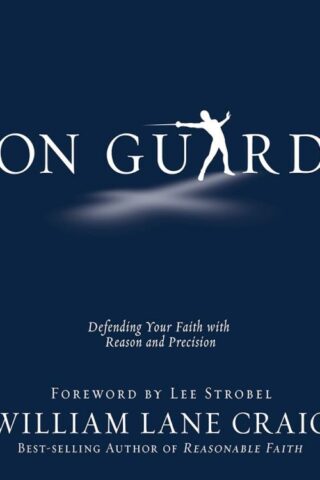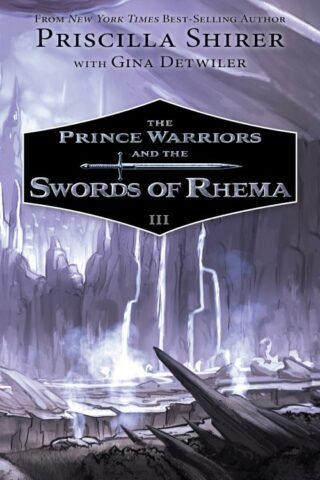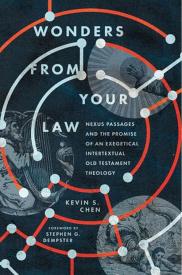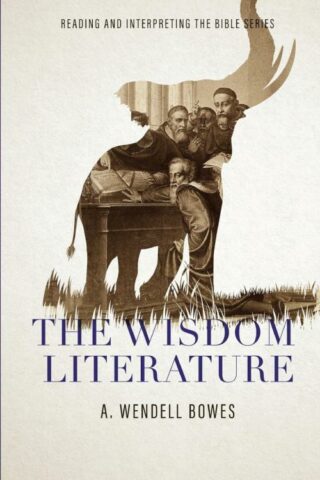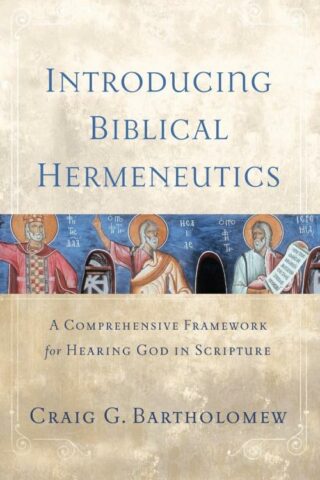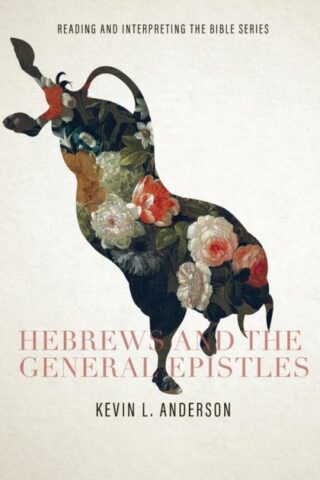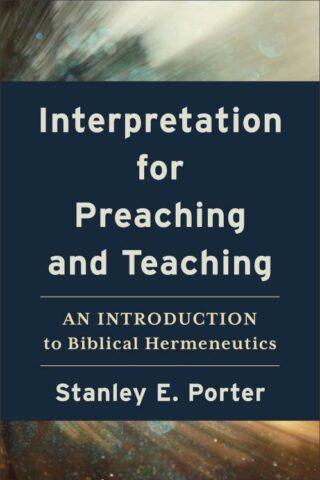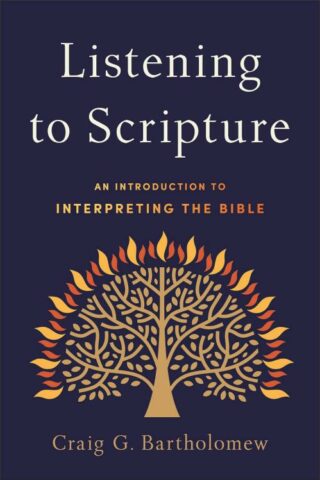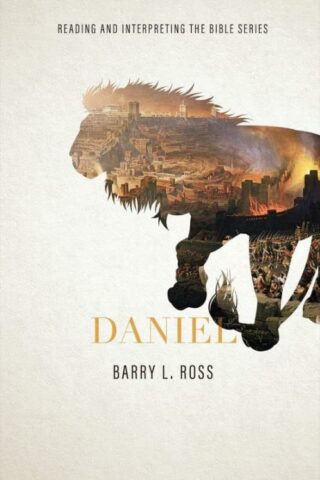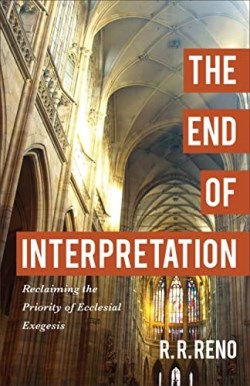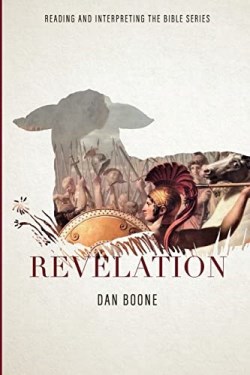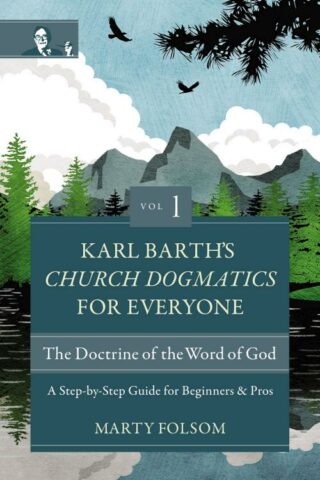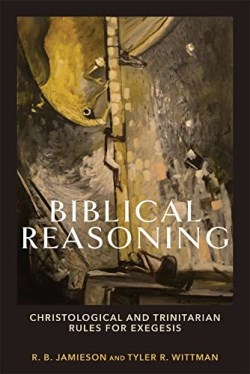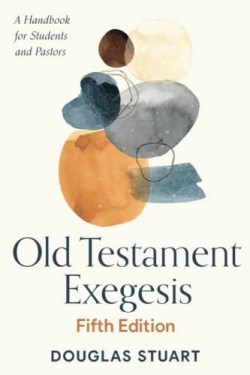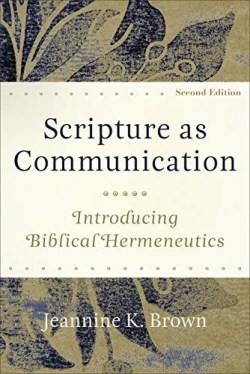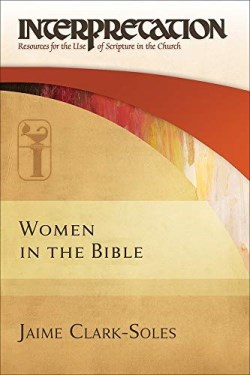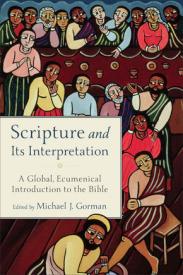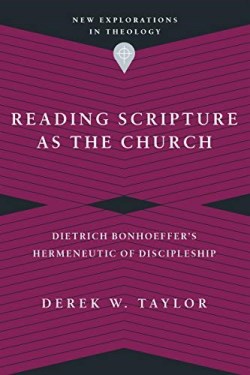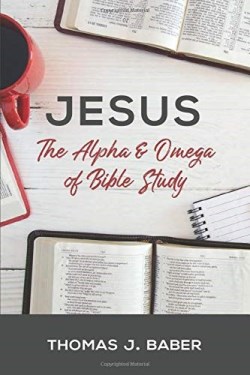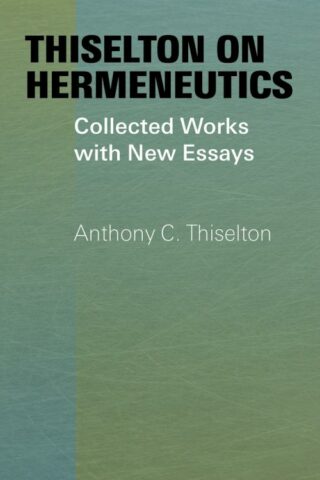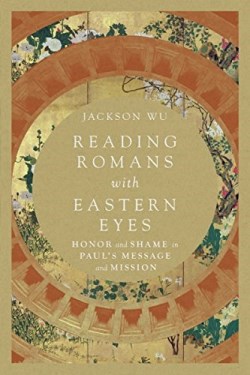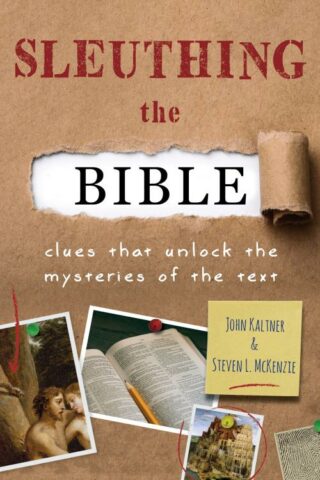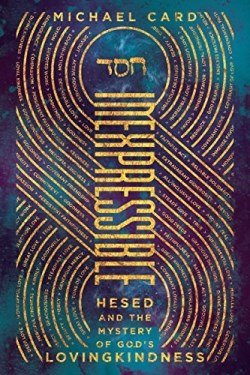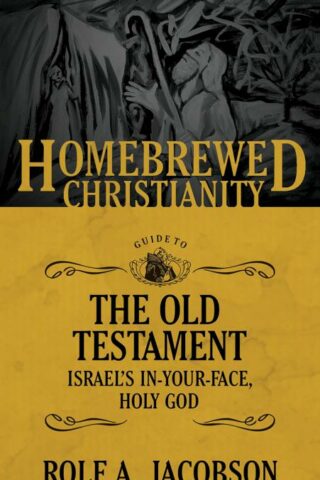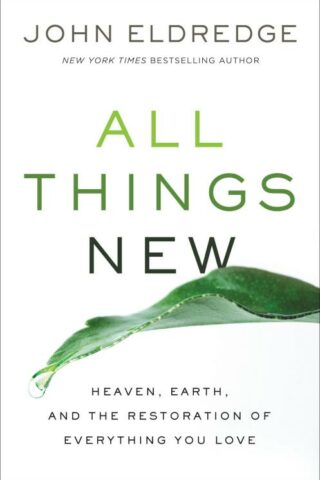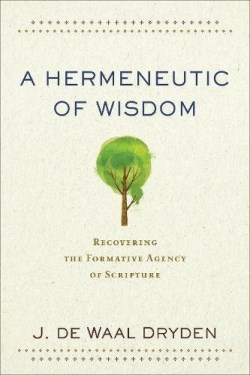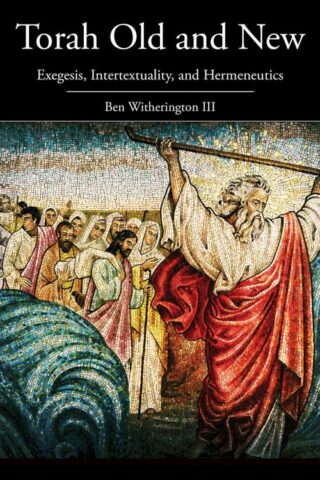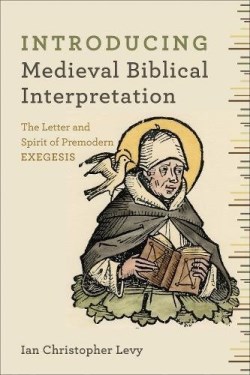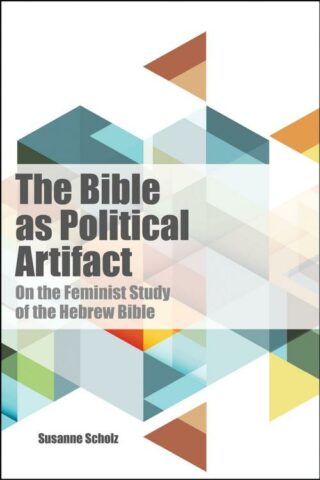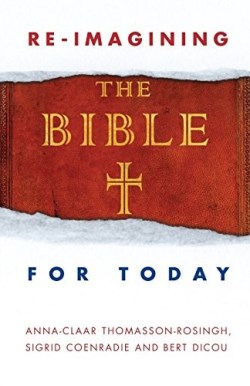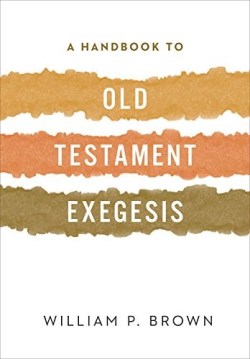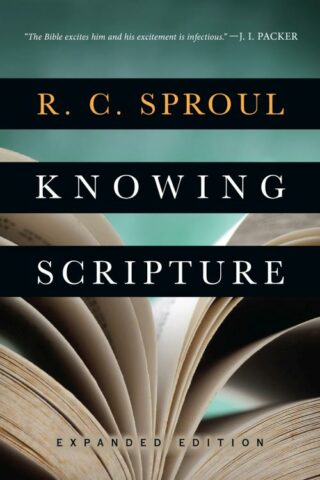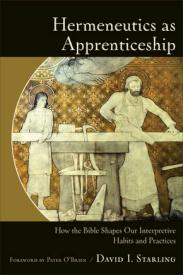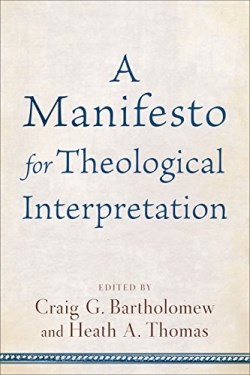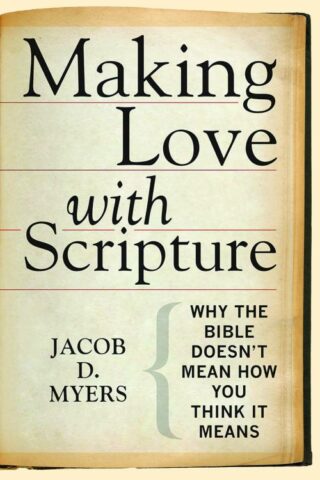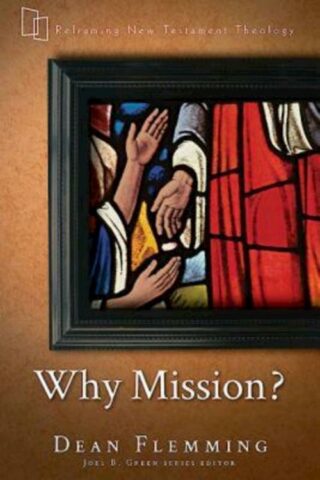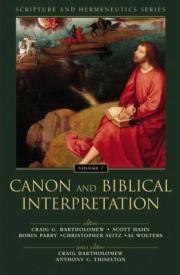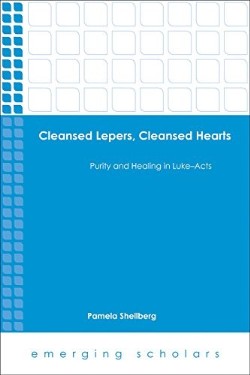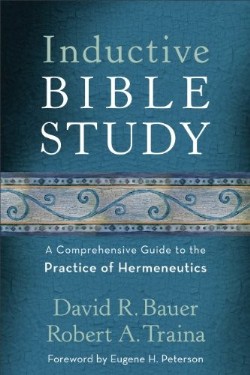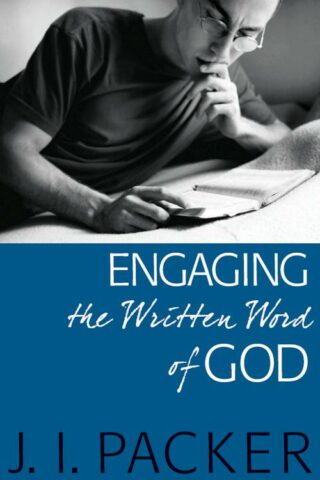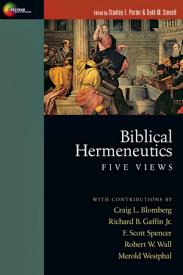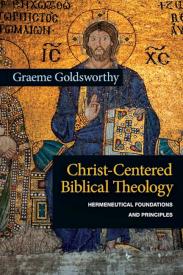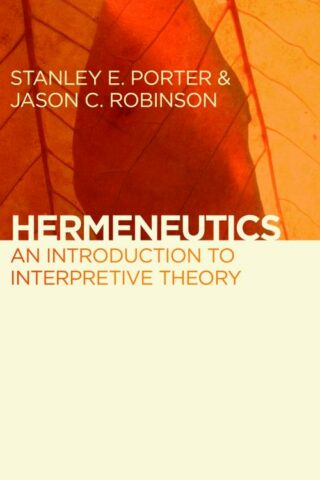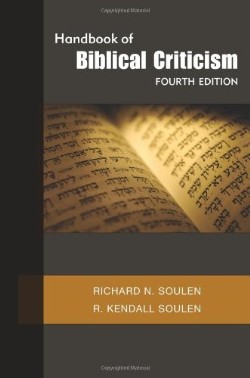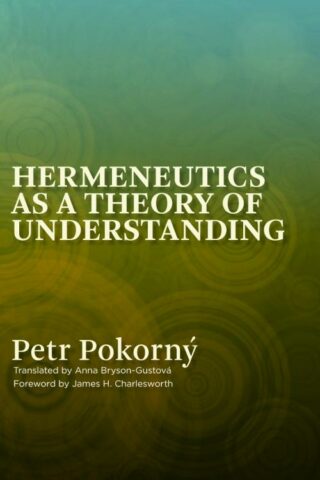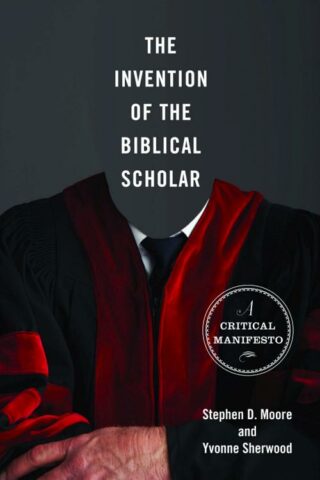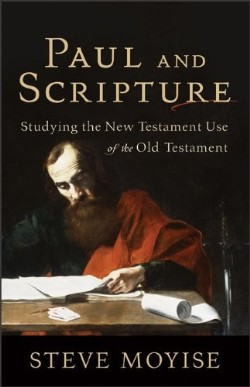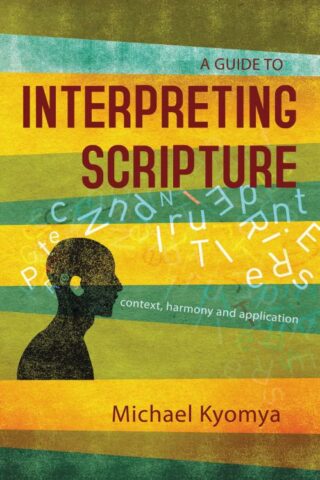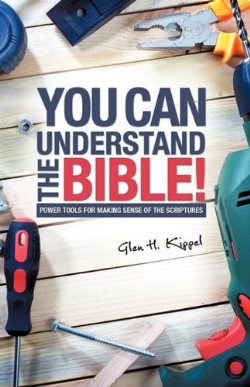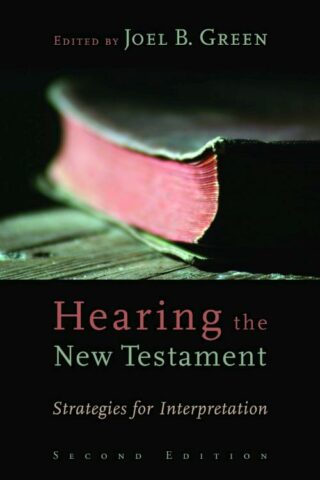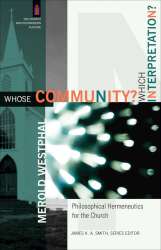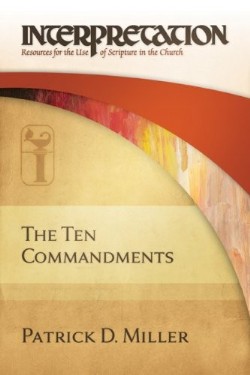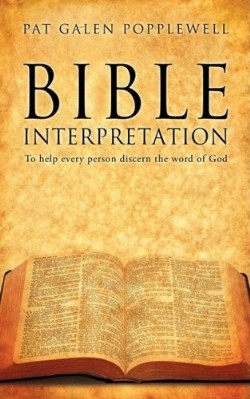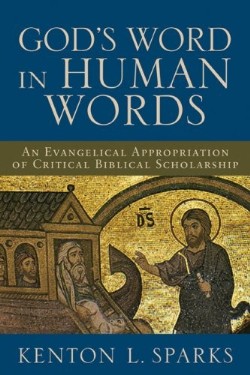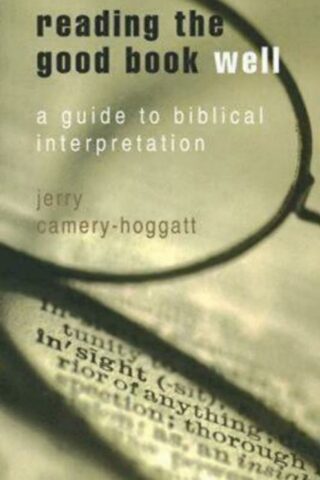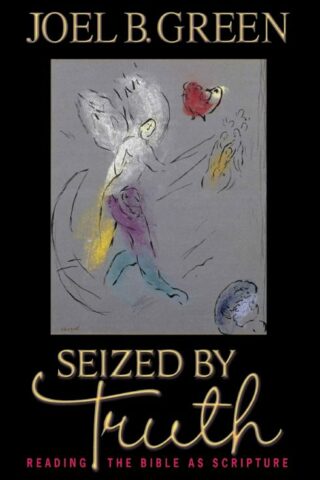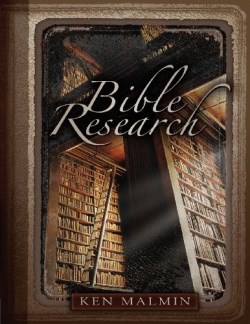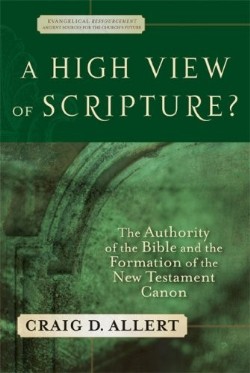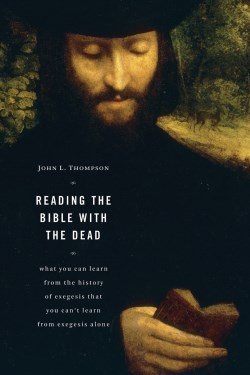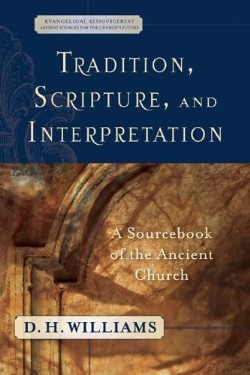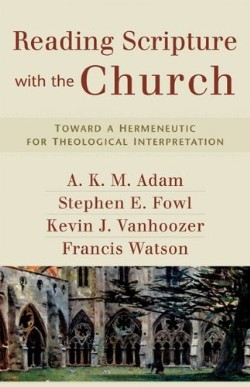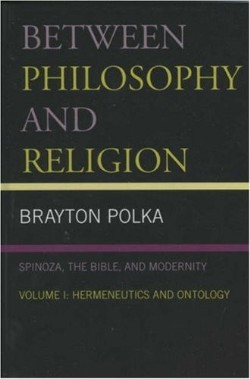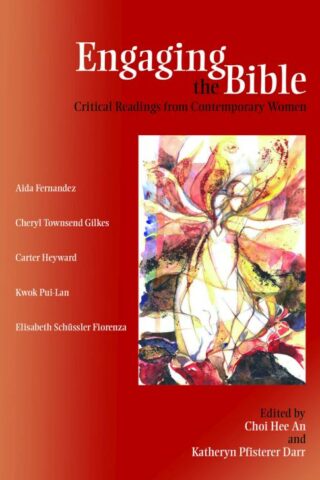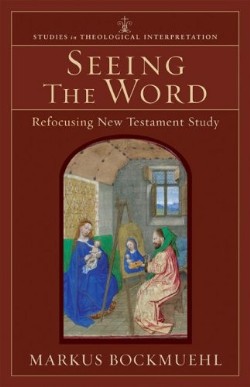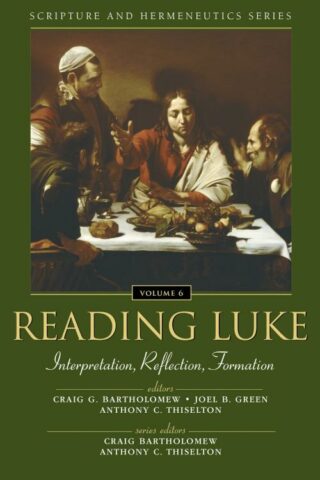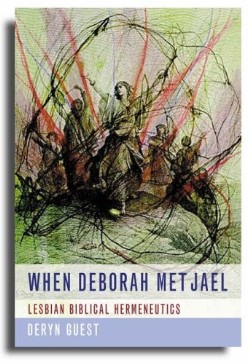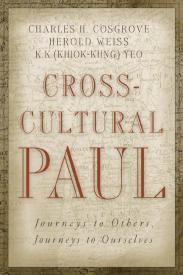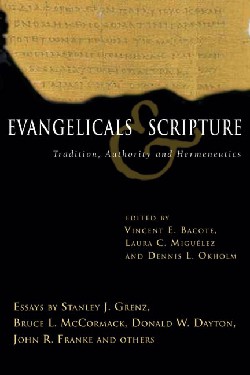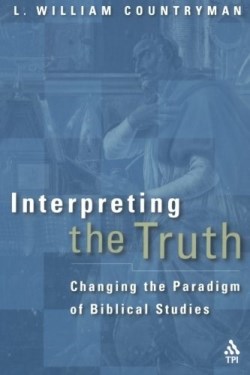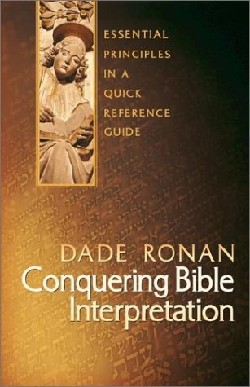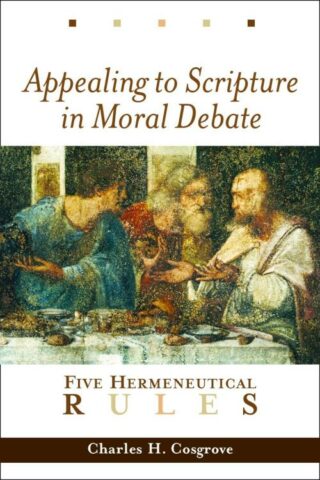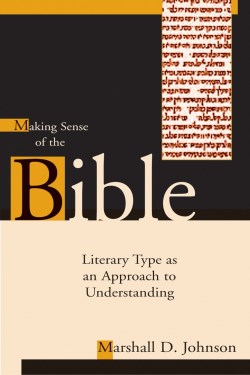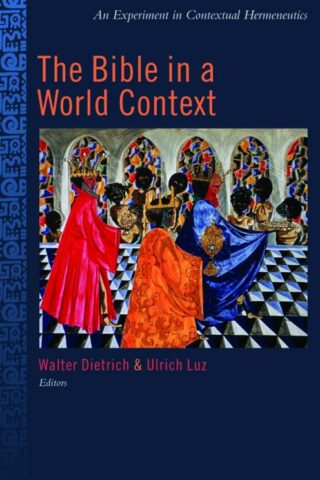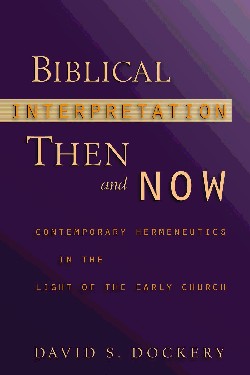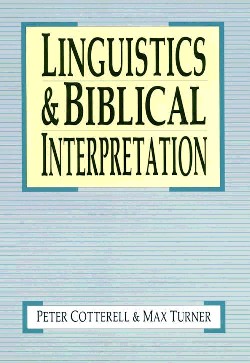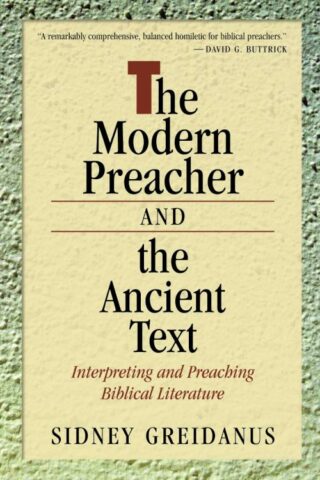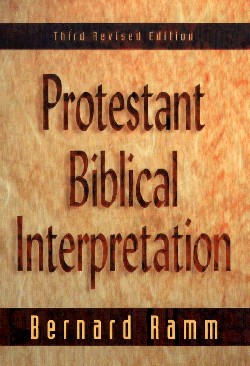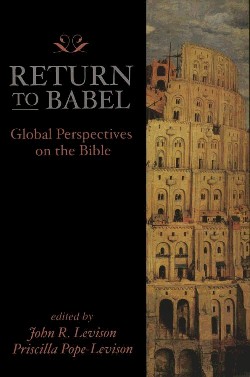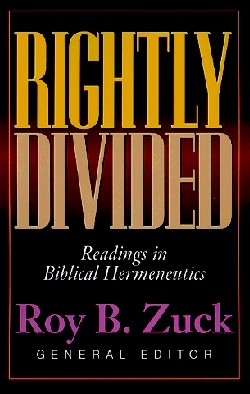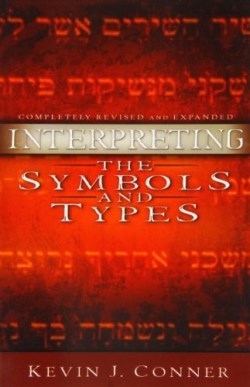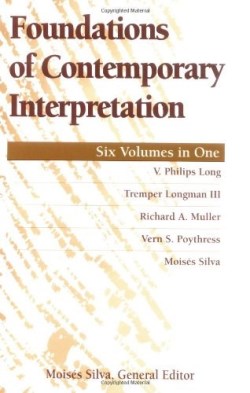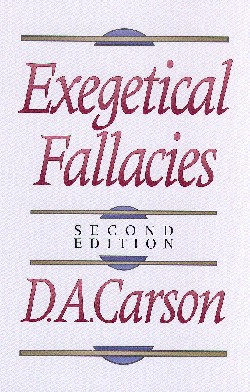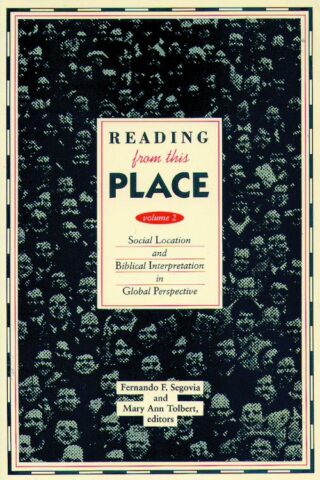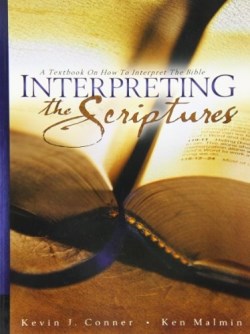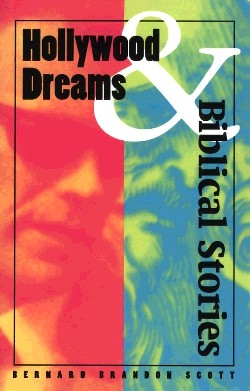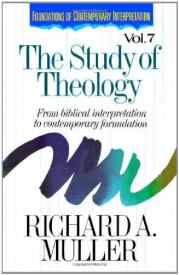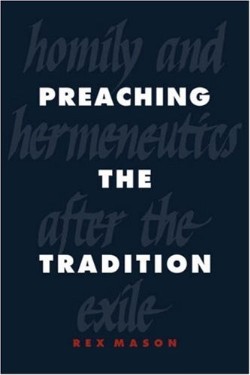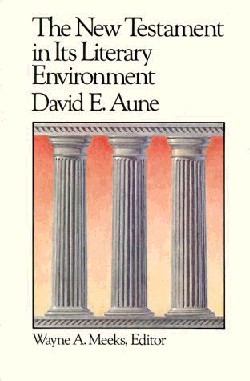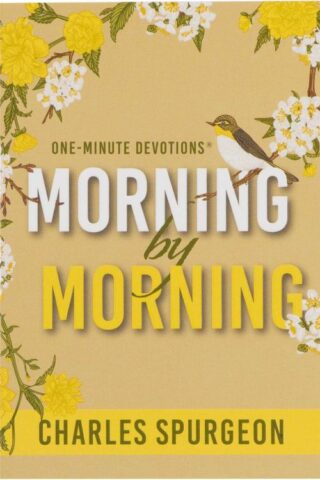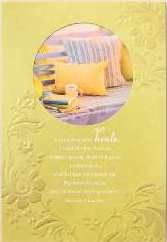Hermeneutics
Showing all 91 resultsSorted by latest
-
Wonders From Your Law
$42.99Finding internal coherence within the Old Testament is a challenging task. Numerous scholars over the centuries have provided various, divergent frameworks to organize the content of the Hebrew Bible. Navigating both the Old Testament itself and the history of its interpretation can feel like a maze of complexity.
Biblical scholar Kevin Chen offers a way of understanding the Old Testament through the orienting lens of what he calls “nexus passages.” Such passages pull the material of the Old Testament together through their high connectivity to other Scripture passages. In his thorough textual analyses, Chen shows how these nexus passages serve as lexical, thematic, and theological hubs for understanding the Old Testament. Both exegetical and intertextual, Wonders From your Law gazes deeply into the text for a constructive, evangelical approach to Old Testament theology.
Add to cartin stock within 3-5 days of online purchase
-
Wisdom Literature
$19.99What is the nature of successful living?
What does it mean to achieve a good life? The Old Testament wisdom literature–Proverbs, Job, and Ecclesiastes–provides perceptive answers to these questions. Though sometimes neglected, this genre, consisting of short sayings and lengthy reflective writings, offers readers thoughtful instructions for living. In this volume of the Reading and Interpreting the Bible Series, A. Wendell Bowes expertly guides readers in interpreting these insightful writings and applying their lessons to everyday life. From exploring the ancient Near Eastern background of these writings to providing interpretations of sample texts, Dr. Bowes has crafted a practical handbook for anyone wanting to study this rich and astute biblical literature. Reading the Bible with understanding is challenging. Without sound guidance, making sense of the different literary types, settings, and cultures found in the Scriptures can be overwhelming. The Reading and Interpreting the Bible Series opens the door to a proper and accessible method of biblical interpretation. Each volume concentrates on a specific literary type found in the Bible, highlighting its features and function. Social, political, and religious settings are examined, and a critical analysis of the biblical text brings to light its message and relevance for today. Readers will find in these volumes numerous illustrations of how to interpret specific texts, which can be used as a pattern for individual or group Bible studies.
Add to cartin stock within 3-5 days of online purchase
-
Introducing Biblical Hermeneutics
$63.52Renowned scholar Craig Bartholomew, coauthor of the bestselling textbook The Drama of Scripture (more than 50,000 copies sold), writes in his main area of expertise–hermeneutics–to help seminarians pursue a lifetime of biblical interpretation. Integrating the latest research in theology, philosophy, and biblical studies, this substantive hermeneutics textbook is robustly theological in its approach, takes philosophical hermeneutics seriously, keeps the focus throughout on the actual process of interpreting Scripture, and argues that biblical interpretation should be centered in the context and service of the church–an approach that helps us hear God’s address today.
Add to cartin stock within 3-5 days of online purchase
-
Hebrews And The General Epistles
$22.21Often neglected and misunderstood, the New Testament books of Hebrews, James, 1-2 Peter, 1-3 John, and Jude present a number of interpretive challenges. From their placement in the biblical canon to their authorship and theological relationship to Paul’s Epistles, these eight books have historically confronted scholars with an assortment of complex issues that require an adept approach for study and understanding. In this volume of the Reading and Interpreting the Bible Series, Kevin Anderson introduces readers to the essential tools for plumbing the depths of these colorful and often controversial writings and applying their meanings to the contemporary church. Helpful tables, diagrams, and an exceptional reference list round out this well-crafted resource. Reading the Bible with understanding is challenging. Without sound guidance, making sense of the different literary types, settings, and cultures found in the Scriptures can be overwhelming. The Reading and Interpreting the Bible Series opens the door to a proper and accessible method of biblical interpretation. Each volume concentrates on a specific literary type found in the Bible, highlighting its features and function. Social, political, and religious settings are examined, and a critical analysis of the biblical text brings to light its message and relevance for today. Readers will find in these volumes numerous illustrations of how to interpret specific texts, which can be used as a pattern for individual or group Bible studies.
Add to cartin stock within 3-5 days of online purchase
-
Interpretation For Preaching And Teaching
$31.76Renowned biblical scholar Stanley Porter offers an accessible introduction to hermeneutics to help students and pastors better interpret and understand God’s Word.
Interpretation for Preaching and Teaching focuses on various levels of interpretation and proclamation, which are arranged in a necessary hierarchy: language and linguistics, the biblical text, biblical theology, systematic theology, and homiletics. Stanley Porter grounds the discussion within a conversation of biblical authority and offers a fresh examination of the key issues. The result is a workable method that introduces each of the major topics of interpretation and addresses some of the complexities of their use.
This book provides the basics for a Bible interpreter to move from fundamental questions about the task of biblical interpretation to understanding a text and its theology to creating and delivering a sermon. It offers valuable guidance for professors and students of hermeneutics and equips pastors and Bible teachers to deliver a relevant message to those who rely on them to be faithful interpreters.
Add to cartin stock within 3-5 days of online purchase
-
Listening To Scripture
$24.99Looking for a guide to interpreting the Bible that is accessible, up-to-date, and theologically grounded? A renowned Old Testament scholar and coauthor of the bestselling The Drama of Scripture introduces us to reading the Bible with an ear toward hearing God’s address. “When we read the Bible, we need to take off our shoes, as it were, because we are on holy ground,” says Bartholomew. “We take up the Bible to read it, only to find that through it God speaks to us. This is the awesome potential of Bible reading and interpretation.”
Bartholomew begins with a theological orientation, including topics such as the relationship between prayer, analysis, and reading Scripture; the Bible as the true story of the whole world; and reading the text in light of its literary, historical, and kerygmatic (proclamation) dimensions. He then explores the history of interpretation before discussing how we receive the Bible liturgically, ethically, and missionally. Throughout the book, exercises in lectio divina invite readers to engage both the head and the heart as they learn to interpret the Bible.
Professors and students of the Bible will value this work. It will also appeal to church leaders and other serious students of the Bible.
Add to cartin stock within 3-5 days of online purchase
-
Daniel
$19.99The book of Daniel is a colorful collage of fascinating stories and visions. From a magnificent statue to a feisty, horn-regenerating goat, readers encounter a cavalcade of fantastic images. Added to these amazing sights are the harrowing confrontations between God’s faithful servants and presumptuous kings. Grasping the meaning of all this is a weighty task. This volume of the Reading and Interpreting the Bible Series aptly meets this challenge, providing readers with the tools to interpret the message of Daniel and apply it to daily life. Using charts, word studies, and deep dives into ancient Middle Eastern culture, Old Testament scholar Barry Ross provides readers with the theological keys to this marvelous book. Reading the Bible with understanding is challenging. Without sound guidance, making sense of the different literary types, settings, and cultures found in the Scriptures can be overwhelming. The Reading and Interpreting the Bible Series opens the door to a proper and accessible method of biblical interpretation. Each volume concentrates on a specific literary type found in the Bible, highlighting its features and function. Social, political, and religious settings are examined, and a critical analysis of the biblical text brings to light its message and relevance for today. Readers will find in these volumes numerous illustrations of how to interpret specific texts, which can be used as a pattern for individual or group Bible studies.
Add to cartin stock within 3-5 days of online purchase
-
End Of Interpretation
$29.41Those who wish to interpret and understand the Bible face a fundamental question: How do I interpret Scripture faithfully? Theological interpretation is an approach that has received much attention in recent years, and R. R. Reno is a leading practitioner and proponent of this approach.
In The End of Interpretation, Reno’s first full statement on the topic, he argues that Scripture is interpreted correctly only when it is read through the lens of creedal orthodoxy–that is, through the apostolic faith. The principle of accordance between doctrine and Scripture is of first importance for solid Christian interpretation.
Reno provides a simple explanation of this multifaceted approach. He wrestles with what makes interpretation “theological” and provides two historical case studies, discussing Origen and the Reformation debate over justification. He then demonstrates what theological interpretation looks like in practice, reflecting on Genesis 1, John 17, and 1 Corinthians. Reno’s insights will benefit serious readers who seek to interpret Scripture faithfully.
Add to cartin stock within 3-5 days of online purchase
-
Revelation
$19.99Lampstands, horsemen, beasts, locusts, and angels-the book of Revelation is filled with these images and more. How does anyone make sense of all this? Dan Boone, in this latest volume of the Reading and Interpreting the Bible Series, cuts a clear path to the plotline of this intriguing biblical book. Boone explores the book of Revelation and its imagery using the narrative elements of entrance, bad news, good news, response, and blessing. With attention given to Revelation’s apocalyptic, prophetic, and epistolary features, the author provides the reader with the sound interpretive clarity needed to understand the message and imagery of this fascinating book. Helpful diagrams are included, along with a bibliography.
Reading the Bible with understanding is challenging. Without sound guidance, making sense of the different literary types, settings, and cultures found in the Scriptures can be overwhelming. The Reading and Interpreting the Bible Series opens the door to a proper and accessible method of biblical interpretation. Each volume concentrates on a specific literary type found in the Bible, highlighting its features and function. Social, political, and religious settings are examined, and a critical analysis of the biblical text brings to light its message and relevance for today. Readers will find in these volumes numerous illustrations of how to interpret specific texts, which can be used as a pattern for individual or group Bible studies.
Add to cartin stock within 3-5 days of online purchase
-
Biblical Reasoning : Christological And Trinitarian Rules For Exegesis
$32.99Two experts in exegesis and dogmatics show how Christology and the Trinity are grounded in Scripture and how knowledge of these topics is critical for exegesis. The book outlines key theological principles and rules for the exegesis of Christian Scripture, making it an ideal textbook for hermeneutics and interpretation courses. The authors explore how the triune God revealed in Christ shapes Scripture and its readers and how doctrinal rules intrinsic to Scripture help guide exegesis.
Add to cartin stock within 3-5 days of online purchase
-
Doctrine Of The Word Of God
$29.99A Guided Tour of One of the Greatest Theological Works of the Twentieth Century
Karl Barth’s Church Dogmatics is considered by many to be the most important theological work of the twentieth century and for many people reading it, or at least understanding it contents and arguments, is a lifelong goal. Yet its enormous size, at over 12,000 pages (in English translations) and enough print volumes to fill an entire shelf, make reading it a daunting prospect for seasoned theologians and novices alike.
Karl Barth’s Church Dogmatics for Everyone, Volume 1–The Doctrine of the Word of God helps bridge the gap for would-be Karl Barth readers from beginners to professionals by offering an introduction to Barth’s theology and thought like no other. User-friendly and creative, this guide helps readers get the gist, significance, and relevance of what Barth intended for the church… to restore the focus of theology and revitalize the practices of the church.
Each section contains insights for pastors, new theologians, professionals, and ordinary people including:
*Summaries of the section
*Contextual considerations
*And other visually informative features that reinforce the main points of the Barth’s thoughtIn addition, each volume features the voices of authors from different academic disciplines who contribute brief reflections on the value of Church Dogmatics for creative discovery in their disciplines. Volume 1 reflections include:
*Douglas Campbell (biblical studies)
*Myk Habets (systematic theology)
*Richard Keith (pastors)
*Julie Canlis (ordinary people)
*James Chaousis (mental health)
*John Vissers (spiritual formation)Whether you are just discovering Barth or want a fresh look at his magnum opus, this series invites you to an enjoyable and insightful journey into the Church Dogmatics.
Add to cartin stock within 3-5 days of online purchase
-
Biblical Reasoning : Christological And Trinitarian Rules For Exegesis
$83.31Two experts in exegesis and dogmatics show how Christology and the Trinity are grounded in Scripture and how knowledge of these topics is critical for exegesis. The book outlines key theological principles and rules for the exegesis of Christian Scripture, making it an ideal textbook for hermeneutics and interpretation courses. The authors explore how the triune God revealed in Christ shapes Scripture and its readers and how doctrinal rules intrinsic to Scripture help guide exegesis.
Add to cartin stock within 3-5 days of online purchase
-
Pauline Epistles
$19.99Many readers may agree with Peter in his second epistle, that Paul’s letters are “hard to understand” and easily distort (3:15-16, NIV). But as David Ackerman in this latest Reading and Interpreting the Bible volume expertly shows, a proper approach to interpretation will yield rich rewards. Ackerman introduces readers to the social world of Paul, his life, and his mission. The reader learns about competing religions, the structure of ancient letters, rhetorical devices, and the pastoral purposes of Paul’s writing. With clear explanations and illustrations using challenging texts, the reader is equipped with the tools needed to separate the timeless from the time-bound and to bridge the gap between Paul’s world and ours.
Reading the Bible with understanding is challenging. Without sound guidance, making sense of the different literary types, settings, and cultures found in the Scriptures can be overwhelming. The Reading and Interpreting the Bible Series opens the door to a proper and accessible method of biblical interpretation. Each volume concentrates on a specific literary type found in the Bible, highlighting its features and function. Social, political, and religious settings are examined, and a critical analysis of the biblical text brings to light its message and relevance for today. Readers will find in these volumes numerous illustrations of how to interpret specific texts, which can be used as a pattern for individual or group Bible studies.
Add to cartin stock within 3-5 days of online purchase
-
Old Testament Exegesis Fifth Edition
$30.00For years, Douglas Stuart’s Old Testament Exegesis has been one of the most popular ways to learn how to perform exegesis-the science and art of interpreting biblical texts properly for understanding as well as proclamation. This new edition includes a major revision and expansion of online and other resources for doing biblical research and updates past editions by including a helpful configuration of the format for the exegesis process. Stuart provides guidance for full exegesis as well as for a quicker approach specifically tailored to the task of preaching. A glossary of terms explains the sometimes-bewildering language of biblical scholarship, and a list of frequent errors guides the student in avoiding common mistakes. No exegetical guide for the Old Testament has been more widely used in training ministers and students to be faithful, careful interpreters of Scripture.
Add to cartin stock within 3-5 days of online purchase
-
Scripture As Communication
$34.99Jeannine Brown, a seasoned teacher of biblical interpretation, believes that communication is at the heart of what happens when we open the Bible. We are actively engaging God in a conversation that can be life changing. In this guide to the theory and practice of biblical hermeneutics, Brown emphasizes the communicative nature of Scripture, proposing a communication model as an effective approach to interpreting the Bible. The new edition of this successful textbook has been revised and updated to interact with recent advances in interpretive theory and practice.
Add to cartin stock within 3-5 days of online purchase
-
Women In The Bible
$50.00What was it like to be a woman in the biblical period? It depended, in part, on who you were: a queen, a judge, a primary wife, a secondary wife, a widow, a slave, or some other kind of ordinary woman. In Women in the Bible, Jaime Clark-Soles investigates how women are presented in Scripture, taking into account cultural views of both ancient societies as well as our own. While women today are exercising leadership in churches across a number of denominations and our scholarly knowledge related to women in the Bible has grown immensely, challenges remain. Most of Christendom still excludes women from religious leadership, and many Christians invoke the Bible to circumscribe women’s leadership in the public square and in the home as well. It is more urgent than ever, therefore, to investigate closely, honestly, and intrepidly what the Bible does and doesn’t say about women.
In a multipronged approach, Clark-Soles treats well-known biblical women from fresh perspectives, highlights women who have been ignored, and recovers those who have been erased from historical memory by particular moves made in the transmission and translations of the text. She explores symbolic feminized figures like Woman Wisdom and the Whore of Babylon and reclaims the uses of feminine imagery in the Bible that often go unnoticed. Chapters focus on themes of God’s relationship to gender, women and violence, women as creators, and women in the ministry of both Jesus and Paul. Clark-Soles aims to equip clergy and other leaders invested in the study of Scripture to consider women in the Bible from multiple angles and, as a result, help people of all genders to live God’s vision of better, more just lives as we navigate the challenges of our complex, globally connected world.
Add to cartin stock within 3-5 days of online purchase
-
Scripture And Its Interpretation
$47.05Top-notch biblical scholars from around the world and from various Christian traditions offer a fulsome yet readable introduction to the Bible and its interpretation. The book concisely introduces the Old and New Testaments and related topics and examines a wide variety of historical and contemporary interpretive approaches, including African, African-American, Asian, and Latino streams. Contributors include N. T. Wright, M. Daniel Carroll R., Stephen Fowl, Joel Green, Michael Holmes, Edith Humphrey, Christopher Rowland, and K. K. Yeo, among others. Questions for reflection and discussion, an annotated bibliography, and a glossary are included.
Add to cartin stock within 3-5 days of online purchase
-
Reading Scriputre As The Church
$41.99The Bible is meant to be read in the church, by the church, as the church. Although the practice of reading Scripture has often become separated from its ecclesial context, theologian Derek Taylor argues that it rightly belongs to the disciplines of the community of faith. He finds a leading example of this approach in the theology of Dietrich Bonhoeffer, who regarded the reading of Scripture as an inherently communal exercise of discipleship. In conversation with other theologians, including John Webster, Robert Jenson, and Stanley Hauerwas, Taylor contends that Bonhoeffer’s approach to Scripture can engender the practices and habits of a faithful hermeneutical community. Today, as in Bonhoeffer’s time, the church is called to take up and read.
Add to cartin stock within 3-5 days of online purchase
-
Jesus : The Alpha And Omega Of Bible Study
$17.63There is something disarming about looking at the way Jesus approached Scripture. Regardless of theological distinctives, true Christians have two things in common. First, they want to be more like Christ. Second, they want to understand the Bible better. These two commitments are enough for those wishing to improve their understanding of Scripture.
This book focuses on the way Jesus interpreted Scripture and was revealed through Scripture. The ultimate goal of this book is for my readers to know the Christ of Scripture more intimately by using sound principles of biblical interpretation that come from Jesus Himself.
Add to cartin stock within 3-5 days of online purchase
-
Thiselton On Hermeneutics
$98.99Anthony Thiselton’s masterful work in the field of hermeneutics has impacted countless students and scholars over the past several decades. Especially influential was his Two Horizons (1980), a call to take seriously the contexts of both the reader and the text. Thiselton’s work continues to carry much weight, yet there has been no single place to go to access a helpful array of his writings — until now.
Thiselton on Hermeneutics provides select expositions and critical discussions of hermeneutics as a multidisciplinary area. Biblical interpretation, philosophical hermeneutics, literary theory, postmodernism, and Christian theology genuinely interact in these forty-two studies to form a coherent whole. Thiselton’s unique interactive and multidisciplinary approach shines through the volume. Ten of these essays — almost a quarter of the collection — are new (never published before) or quite recent.
Theologians, biblical scholars, philosophers, and many other academics will appreciate this distillation of the pioneering perspectives and creative insights of Anthony C. Thiselton.
Add to cartin stock within 3-5 days of online purchase
-
Reading Romans With Eastern Eyes
$28.99Introduction
1. How To Read With Eastern Eyes
2. Paul’s Mission Frames His Message (Rom 1, 15)
3. Dishonoring God And Ourselves (Rom 1-2)
4. Distinguishing “Us” And “Them” (Rom 2)
5. Christ Saves God’s Face (Rom 3)
6. Who Is Worthy Of Honor? (Rom 4)
7. Faith In The Filial Christ (Rom 5-6)
8. The Hope Of Glory Through Shame (Rom 5-8)
9. Shamed From Birth? (Rom 7)
10. They Will Not Be Put To Shame (Rom 9-11)
11. Honor One Another (Rom 12-13)
12. The Church As “Harmonious Society” (Rom 14-16)
Discussion Guide
Bibliography
Author Index
Subject Index
Scripture IndexAdditional Info
What does it mean to “read with Eastern eyes”? According to Jackson Wu, an Eastern perspective is in many ways culturally closer to that of the first-century world. Cultural values of honor and shame, social status, tradition, hierarchy, and relationships are similar in both East Asia and the New Testament.As readers, we bring our cultural understanding and values to the text. Our biases and background influence what we observe-and what we overlook. Wu aims to help us develop our “Eastern lenses” in order to interpret Scripture well and gain insights we might have missed.
In Reading Romans with Eastern Eyes, Wu demonstrates how an Eastern perspective sheds light on Paul’s most complex letter. When read this way, we see how honor and shame shape so much of Paul’s message and mission.
Add to cartin stock within 3-5 days of online purchase
-
Sleuthing The Bible
$28.99Why is there crime-scene tape on my Bible? Elementary, my dear reader.There is an element of detective work to biblical scholarship that entails sniffing out and interpreting clues that often escape the notice of readers. John Kaltner and Steven L. McKenzie introduce the art of sleuthing the Bible, providing the necessary training to hunt for clues and piece them together to understand the larger picture.Sleuthing the Bible helps answer questions that occur during thoughtful examination of the Bible and provides exercises enabling readers to work through biblical passages on their own. Kaltner and McKenzie analyze two kinds of clues: (1) Smoking Guns- those that are obvious upon any close reading of biblical texts, and (2) Dusting for Prints-those that are more subtle or hidden from nonspecialists because of their unfamiliarity with the languages, culture, and larger content of the Bible.Written in a jargon-free and accessible style, Sleuthing the Bible is an ideal resource for anyone who wants to dig deeper into the biblical text.
Add to cartin stock within 3-5 days of online purchase
-
Inexpressible : Hesed And The Mystery Of Gods Loving Kindness
$19.99Preface: The Untranslatable Defining The Inexpressible
Introduction: A Word On The Meaning Of WordsPart I. The God Of Hesed
1. Opening The Door
2. The Definitive Encounter
3. Slow To Anger
4. Like No Other God
5. An Everlasting Refrain
6. A Prayer Of Honest RagePart II. The Objects Of Hesed
7. When Dinah Held My Hand
8. The Heseds Of David
9. Ethan: “I Will Sing”
10. Moses: “In The Morning”
11. Jeremiah: “I Am Hesed”
12. Hosea: A Novel Of HesedPart III. Hesed Finally Defined
13. Hesed And Truth
14. On Jesus’ Lips
15. How To Amaze Jesus
16. The One Who Showed Hesed
17. Paul And The Path To RedemptionPart IV. An Instinct For Hesed
18. Here, Rabbi, Take My Seat
19. Hesed In Post-AD 70 Judaism
20. Gemilut Hesed And Tikkun OlamConclusion: Do Justice, Love Mercy, Walk Humbly: The Monumental Nature Of Kindness
Afterword
Acknowledgments
Appendix A: Occurrences Of Hesed In Scripture
Appendix B: Comparison Of Translations
Appendix C: A Vocabulary Of Associated Words
Appendix D: For Further Study
Notes
Bibliography
Scripture IndexAdditional Info
God’s identity is beyond what we could ever fully express in human words. But Scripture uses one particular word to describe the distinctiveness of God’s character: the Hebrew word hesed.Hesed is a concept so rich in meaning that it doesn’t translate well into any single English word or phrase. Michael Card unpacks the many dimensions of hesed, often expressed as lovingkindness, covenant faithfulness, or steadfast love. He explores how hesed is used in the Old Testament to reveal God’s character and how he relates to his people. Ultimately, the fullness of hesed is embodied in the incarnation of Jesus.
As we follow our God of hesed, we ourselves are transformed to live out the way of hesed, marked by compassion, mercy, and faithfulness. Discover what it means to be people of an everlasting love beyond words.
Add to cartin stock within 3-5 days of online purchase
-
Homebrewed Christianity Guide To The Old Testament
$24.98Introduction
Chapter 1: The Old Testament-The Library Of An In-Your-Face God
Chapter 2: A Down-and-Dirty Creator-A Downright-Broken Creation
Chapter 3: Blessed To Be A Blessing, And Other Terrifying Thoughts
Chapter 4: From Pyramid To Promised Land: God’s Free People (Exodus Through Joshua)
Chapter 5: You Cannot Serve The Lord-Really, You Can’t (The History Of Israel And Judah; Joshua 23-2 Kings)
Chapter 6: Mourning Into Dancing, Or How To Get In God’s Face
EpilogueAdditional Info
The Old Testament bears witness to an in-your-face, holy God–a God who gets down and dirty with creation and history; a God who gets in people’s face with love and law, with power and purpose. Yet Israel’s in-your-face God is also “holy”–too other, too raw, too intense to be handled without oven mitts.Rolf Jacobson wrestles with this in-your-face God.The Old Testament starts at the beginning, where God digs in the dirt to create humanity and then gets in the dustlings’ faces when they sin. God smiles on Abraham and Sarah, electing their descendants as the chosen people, but has to get in Pharaoh’s face when he tries to enslave the people. Mostly, God gets in Israel’s face: with laws about what it looks like to be God’s people and through the prophets, who have to get in the faces of those who turn away from the Holy One.Jacobson also explores the psalms, poetry in which God often hides his face. He closes by exploring how the Old Testament points us ahead to Jesus, when God took on a human face and offered us the most intimate picture of God we’ll ever get.Add to cartin stock within 3-5 days of online purchase
-
All Things New
$19.99New York Times bestselling author John Eldredge offers readers a breathtaking look into God’s promise for a new heaven and a new earth.
This revolutionary book about our future is based on the simple idea that, according to the Bible, heaven is not our eternal home–the New Earth is. As Jesus says in the gospel of Matthew, the next chapter of our story begins with “the renewal of all things,” by which he means the earth we love in all its beauty, our own selves, and the things that make for a rich life: music, art, food, laughter and all that we hold dear. Everything shall be renewed “when the world is made new.”
More than anything else, how you envision your future shapes your current experience. If you knew that God was going to restore your life and everything you love any day; if you believed a great and glorious goodness was coming to you–not in a vague heaven but right here on this earth–you would have a hope to see you through anything, an anchor for your soul, “an unbreakable spiritual lifeline, reaching past all appearances right to the very presence of God” (Hebrews 6:19).
Most Christians (most people for that matter) fail to look forward to their future because their view of heaven is vague, religious, and frankly boring. Hope begins when we understand that for the believer nothing is lost. Heaven is not a life in the clouds; it is not endless harp-strumming or worship-singing. Rather, the life we long for, the paradise Adam and Eve knew, is precisely the life that is coming to us. And that life is coming soon.
Add to cartin stock within 3-5 days of online purchase
-
Torah Old And New
$61.25Reading the books of the Law, the Pentateuch, in their original context is the crucial prerequisite for reading their citation and use in later interpretation, including the New Testament writings, argues Ben Witherington III. Here, he offers pastors, teachers, and students an accessible commentary on the Pentateuch, as well as a reasoned consideration of how these books were heard and read in early Christianity. By reading “forward and backward,” Witherington advances the scholarly discussion of intertextuality and opens a new avenue for biblical theology.
Add to cartin stock within 3-5 days of online purchase
-
Bible As Political Artifact
$65.00Biblical studies and the teaching of biblical studies are clearly changing, though it is less clear what the changes mean and how we should evaluate them. In this book, Susanne Scholz engages some of the issues as she has encountered them in the field over the last twenty years. She casts a feminist, class-critical eye on the politics of pedagogy, in higher education and in wider society alike, decrypting important developments in “the architecture of educational power.” She also examines how the increasingly intercultural, interreligious, and diasporic dynamics in society inform the hermeneutical and methodological possibilities for biblical exegesis, whether the topic is rape in ancient Near Eastern legislation or Eve and Adam in the American Christian right”s approaches. In bold strokes, Scholz lays out a program for biblical scholarship and pedagogy that connects to current events and ideas, such as the Title IX debate, inclusive language, or film. Taken as a whole, the fourteen chapters demonstrate that the foregrounding of gender, placed into its intersectional contexts, offers intriguing and valuable alternative ways of seeing the world and the Bible”s place in it.
Add to cartin stock within 3-5 days of online purchase
-
Re Imagining The Bible For Today
$35.99The early 21st century has seen an unexpected rise of new or rediscovered ways of reading the Bible, both in academic circles and in churches, with surprising results. These ancient texts appear to have a message that resonates with discussions in society at large. This textbook seeks to reclaim the Bible for a Christianity that is open to society and keen on participating in conversation about today’s major issues; a Christianity that is relevant to the personal spirituality of people who aren’t too sure what to believe and how to exercise faith.
Add to cartin stock within 3-5 days of online purchase
-
Handbook To Old Testament Exegesis
$45.00Designed for both Hebrew and non-Hebrew students, A Handbook to Old Testament Exegesis offers a fresh, hands-on introduction to exegesis of the Old Testament. William P. Brown begins not with the biblical text itself but with the reader, helping students to identify their own interpretive lenses before engaging the biblical text. Brown guides the student through a wide variety of interpretive approaches, including modern methodologies?feminist, womanist, Latino/a, queer, postcolonial, disability, and ecological approaches?alongside more traditional methods. This allows students to critically reflect on themselves as bona fide interpreters. While covering a wide range of biblical passages, Brown also highlights two common biblical texts throughout the work to help show how each interpretive approach highlights different dimensions of the same texts. Students will appreciate the value of an empathetic inquiry of Scripture that is both inclusive of others and textually in-depth.
Add to cartin stock within 3-5 days of online purchase
-
Knowing Scripture (Expanded)
$19.99The Bible is the written Word of God, and it is treasured by many. But it is also an ancient book about people and cultures very different than us. Thus, while we know we should read it, many of us have a hard time understanding the Bible. In this expanded edition of Knowing Scripture, R. C. Sproul helps us dig out the meaning of Scripture for ourselves. The author says, “The theme of this book is not how to read the Bible but how to study the Bible.” He presents in simple, basic terms a commonsense approach to studying Scripture and gives eleven practical guidelines for biblical interpretation and applying what we learn. With a minimum of technical jargon, Sproul tackles some of the knotty questions regarding differences of interpreting the Bible, including discovering the meanings of biblical wordsunderstanding Hebrew poetry, proverbs and parablesapproaching historical and didactic passagesbeing careful with predictive prophecydiscerning how culture conditions the Biblechoosing and using Bible translations, commentaries, Bible software and other helpsKnowing Scripture is a basic book for both beginning Bible readers and experienced students of Scripture.
Add to cartin stock within 3-5 days of online purchase
-
Manifesto For Theological Interpretation
$56.66Recent decades have witnessed a renaissance of theological interpretation. Craig Bartholomew, coauthor of the bestselling The Drama of Scripture, and Heath Thomas bring together a team of specialists to articulate a multifaceted vision for returning rigorous biblical interpretation to the context of the church. Developed by the internationally recognized Scripture and Hermeneutics Seminar, this book is designed to bring clarity and unity to the enterprise of theological interpretation. It positively integrates multiple approaches to interpreting the Bible, combining academic rigor with pastoral sensitivity for professors, students, and church leaders.
Add to cartin stock within 3-5 days of online purchase
-
Making Love With Scripture
$28.31Nothing has been more contentious in the history of Christianity than the meaning of the Bible, and that debate continues today. Arguments over scripture have divided denominations, churches, and families, and these squabbles have led many to abandon the faith altogether. Jacob D. Myers, a rising young scholar, has a solution to the problem with scripture. The instability of the Bible’s meaning, he argues, is not a weakness but a strength, and it can benefit conservatives and liberals alike.
In a conversational style peppered with pop culture references, Myers provides a variety of tools for readers of the Bible, helping the experienced and inexperienced alike appreciate the sacred text in new ways. Finally, he proposes the intriguing alternative of an “erotic” interpretation, one that makes love with the Bible and opens new vistas of understanding.
Add to cartin stock within 3-5 days of online purchase
-
Why Mission
$35.99Recent years have seen heightened efforts at reading the New Testament in terms of God’s mission. This has pressed against commitments to a dispassionate reading of the New Testament books in favor of a self-involved, missiological reading. This book harvests recent efforts as well as extends the conversation by an approach that takes seriously the contribution of diverse New Testament voices. This book contributes to New Testament studies, but also serves related discussions in missiology and evangelism. Reframing New Testament Theology is a series that fulfills the need for brief, substantive, yet highly accessible introductions to central questions and themes raised by study of the New Testament. A significant defining question will serve as the point of departure and will frame the discussion. Students will be drawn into an active, theological engagement with the New Testament and related materials by the subsequent analysis.
Add to cartin stock within 3-5 days of online purchase
-
Canon And Biblical Interpretation
$36.99Drawing on a broad array of contributors, volume seven of the Scripture and Hermeneutics Series assesses the current state of canonical interpretation and uses that as a starting point for exploring ingredients in theological interpretation of the Bible today. Canon and Biblical Interpretation begins with a masterful examination of the canonical approach and the various criticisms that have been leveled against it. Additional chapters look at canonical interpretation in relation to different parts of the Bible, such as the Pentateuch, the Wisdom books, the Psalms, and the Gospels. Articles address such issues as canonical authority and the controversial relationship between canonical interpretation and general hermeneutics. A unique chapter explores the relationship between academic exegesis and lectio divina. Editors: – Craig Bartholomew – Robin Parry – Scott Hahn – Christopher Seitz – Al Wolters
Add to cartin stock within 3-5 days of online purchase
-
Cleansed Lepers Cleansed Hearts
$81.66Illnesses are perceived and understood differently across cultures and over time. Traditional interpretations of New Testament texts frame the affliction lepra (“leprosy”) as addressed either by ritual cleansing or miraculous healing. But as Pamela Shellberg shows, these interpretations are limited because they shift modern ideas of “leprosy” to a first-century context without regard for how the ancients themselves thought about lepra. Reading ancient medical texts, Shellberg describes how Luke might have perceived lepra and used the language of “clean” and “unclean” and demonstrates how Luke’s first-century understandings shaped his report of Peter’s dream in Acts 10 as a warrant for Gentile inclusion.
For Luke, “cleansing” was how the favor of God announced by Isaiah was extended to Gentiles, and the stories of Jesus’ cleansing of leprous bodies in the Gospel are the pattern for the divine cleansing of Gentile hearts in Acts. Shellberg illuminates Luke’s understanding of “cleansing” as one of his primary expressions of the means of God’s salvation and favor, breaking down and breaking through the distinctions between Jew and Gentile. Shellberg’s conclusions take up the value of Luke’s emphasis on the divine prerogative to declare things “clean” for discussions of inclusion and social distinction today.
Add to cartin stock within 3-5 days of online purchase
-
Engaging The Written Word Of God
$24.98In this collection of articles written over forty years, Packer sets out his beliefs about the authority of Scripture and the principles that should be applied when interpreting it. Important topics such as the adequacy of human language, upholding the unity of Scripture, and challenges in Biblical interpretation are considered in the first two sections: God’s Inerrant Word and Interpreting the Word. In the final section, Preaching the Word, Packer turns his attention to pastoral leaders and the importance of correct and responsible expository preaching.
Add to cartin stock within 3-5 days of online purchase
-
Biblical Hermeneutics : Five Views
$29.99The latest in the Spectrum Multiview series, this book provides a forum for proponents of five approaches to biblical hermeneutics to state their case, respond to the others, and then provide a summary response and statement. Five seasoned scholars contribute to the multifaceted discussion over this contested discipline: Craig Blomberg with the historical-critical/grammatical approach, Richard Gaffin with the redemptive-historical approach, Scott Spencer with the literary/postmodern approach, Robert Wall with the canonical approach and Merold Westphal with the philosophical/theological approach.
Add to cartin stock within 3-5 days of online purchase
-
Christ Centered Biblical Theology
$29.99The appeal of biblical theology to Christians is that it provides a “big picture” that makes sense of the bulk and variety of the biblical literature. It seeks to view the whole scene of God’s revelation of his one mighty plan of salvation. The Bible ceases to be a mass of unconnected texts, and begins to look like a unity that connects the narratives of Israel with those of the four Gospels; that shows up in the progression from creation to new creation; and that highlights the life, death and resurrection of Jesus Christ as the primary focus of the whole Bible. If the Bible is indeed the one word of the one God about the one way of salvation through the one Savior, Jesus Christ, it is biblical theology that reveals this to us. Over the last fifty years, Graeme Goldsworthy has refined his understanding of biblical theology that came about as a result of his experiences as a student, pastor and teacher in theological education. His approach was first presented in Gospel and Kingdom, and more comprehensively in According to Plan. It has been welcomed in some circles, but has not been without its critics. In this valuable complement to his volume Gospel-Centered Hermeneutics, Goldsworthy defends and refines the rationale for his approach, which has drawn particularly on that developed by the Australian biblical scholar Donald Robinson. Goldsworthy’s conviction is that biblical theology is foundational for evangelical hermeneutics, indispensable in expository preaching, and life-giving to pastoral ministry.
Add to cartin stock within 3-5 days of online purchase
-
Hermeneutics : An Introduction To Interpretive Theory
$35.99In this concentrated, intelligible, and useful introductory volume Stanley Porter and Jason Robinson give a splendid overview of hermeneutical and interpretive thought. Neither an all-inclusive survey that moves too quickly over the surface of complex issues nor a specialized volume on a single, narrow topic, Porter and Robinson’s Hermeneutics provides critical analysis of major movements and figures in hermeneutics and interpretive theory in the modern era — from Schleiermacher and Heidegger to Thiselton and Culpepper — showing especially how these interpreters and their movements have impacted biblical and theological study.
Add to cartin stock within 3-5 days of online purchase
-
Handbook Of Biblical Criticism (Revised)
$37.00The 4th edition of this best-selling textbook continues to be a valuable resource for the beginning student in the critical study of the Bible. Thoroughly revised to include the newest methods, recent discoveries, and developments in the field of biblical criticism over the past decade, the Handbook of Biblical Criticism is designed to be a starting point for understanding the vast array of methods, approaches and technical terms employed in this field. Updates in this edition also include an expanded dictionary of terms, phrases, names, and frequently used abbreviations and a bibliography that includes the most up-to-date date publications.
The Handbook of Biblical Criticism is a valuable introductory textbook, a handy, reliable guide for pastors, laypersons, and for scholars whose expertise lies in other fields.
Add to cartin stock within 3-5 days of online purchase
-
Hermeneutics As A Theory Of Understanding 1
$33.99In this primer on hermeneutics, Petr Pokorny takes up basic issues in understanding from language in general to the interpretation of the Bible.
While Hermeneutics as a Theory of Understanding deals with most of the problems of hermeneutics and their role in society and impact in history, the book’s main aim is not to introduce new methodologies or to investigate the character of human understanding by new probes into literary or historical documents. Instead, Pokorny’s principal intention is to define the philosophical and theological premises of individual projects of understanding – their interrelations, meaning, and function in interpretation, especially that of ancient texts such as the Bible.
Pokorny’s work here functions admirably both as a text for students and as a monograph that suggests new paths in hermeneutical discussion.
Add to cartin stock within 3-5 days of online purchase
-
Invention Of The Biblical Scholar
$43.33Acknowledgments
Preface: The Irreducible Strangeness Of The Biblical Scholar1. Theory And Methodolatry
2. The Invention Of The Biblical Scholar
3. Onwards Towards The PastIndex
Additional Info
What is a “biblical scholar”? Stephen D. Moore and Yvonne Sherwood provide a thoroughly defamiliarizing and frequently entertaining re-description of this peculiar academic species and its odd disciplinary habitat. The modern-and -biblical scholar, they argue, is a product of the Enlightenment. Even when a biblical scholar imagines that she is doing something else entirely (something confessional, theoretical, literary, or even postmodern), she is sustaining Enlightened modernity and its effects. This study poses questions for scholars across the humanities concerned with the question of the religious and the secular. It also poses pressing questions for scholars and students of biblical interpretation: What other forms might biblical criticism have taken? What untried forms might biblical criticism yet take?Add to cartin stock within 3-5 days of online purchase
-
Handbook Of New Testament Exegesis (Reprinted)
$40.00Introduction
1. Textual Criticism
2. Translation And Translations
3. Historical-Cultural Context
4. Literary Context
5. Word Studies
6. Grammar
7. Interpretive Problems
8. Outlining
9. Theology
10. Application
Summary
Appendix: Checklist For Doing Biblical ExegesisAdditional Info
This handbook provides a one-stop-shopping guide to the New Testament exegetical method. Brief and approachable, it offers both a broad overview of the exegetical process and a step-by-step approach to studying the New Testament in depth, helping students and pastors understand the text and appropriate it responsibly. The book is chock-full of illustrations of New Testament texts where the method under discussion truly makes a difference.Add to cartin stock within 3-5 days of online purchase
-
Paul And Scripture
$29.41Introduction
1. Paul And The Creation Stories
2. Paul And Abraham
3. Paul And Moses
4. Paul And The Law
5. Paul And The Prophets: Israel And The Gentiles
6. Paul And The Prophets: The Life Of The Christian Community
7. Paul And The Writings
8. Modern Approaches To Paul’s Use Of Scripture
Appendix 1: Paul’s Quotations From Isaiah
Appendix 2: Index Of Paul’s Quotations
Appendix 3: Extracts From The Dead Sea Scolls
IndexesAdditional Info
There are over one hundred explicit quotations of Scripture in Paul’s letters and at least two hundred allusions. The coming of Jesus and the birth of the church caused Paul to look at the Scriptures with new eyes, sometimes clarifying what was written and sometimes reinterpreting it. This volume illuminates Paul’s use of the Old Testament, providing a big-picture overview for students of the New Testament. Steve Moyise, a recognized expert on the use of the Old Testament in the New, discusses Paul’s handling of creation stories, Abraham, Moses, the Law, the Prophets, and the Writings. He then assesses competing contemporary approaches to Paul’s interpretations of Scripture.Add to cartin stock within 3-5 days of online purchase
-
Guide To Interpreting Scripture
$14.99Quoting verses without regard to context can have serious consequences. In A Guide to Interpreting Scripture, Dr. Michael Kyomya illustrates what scriptural interpretation is, why it is important, how to do it, and the pitfalls to avoid. Full of ways to enrich your personal study of the Bible, this guide will equip you with the knowledge and instruction you need.
Add to cartin stock within 3-5 days of online purchase
-
You Can Understand The Bible
$15.61This book will give you the power tools you need to accurately interpret the Word of God. Written in a breezy, conversational style with occasional flashes of humor, this easy-to-read book is your practical, hands-on guide to understanding where the Bible came from, how to pronounce all those unintelligible names, and why it is so important that you understand the world’s most read but sometimes least understood book.
Add to cartin stock within 3-5 days of online purchase
-
Hearing The New Testament (Reprinted)
$44.99The Challenge Of Hearing The New Testament
Joel B. GreenTextual Criticism Of The New Testament
Bart D. EhrmanHistorical Criticism And Social-Scientific Perspectives In New Testament Study
Stephen C. BartonThe Relevance Of Extracanonical Jewish Texts To New Testament Study
Richard BauckhamThe Relevance Of Greco-Roman Literature And Culture To New Testament Study
Loveday C. A. AlexanderTraditio-Historical Criticism
Holly J. CareyThe Use Of The Old Testament By New Testament Writers
Richard B. Hays And Joel B. GreenGenre Analysis
James L. BaileyRhetorical Criticism
C. Clifton BlackModern Linguistics And Word Study In The New Testament
Max TurnerDiscourse Analysis And New Testament Interpretation
Joel B. GreenNarrative Criticism
Mark Allan PowellThe Reader In New Testament Interpretation
Kevin J. VanhoozerFeminist Criticism
F. Scott SpencerAfrican American Criticism
Emerson B. PoweryLatino/a Hermeneutics
Efrain AgostoReading The New Testament In Canonical Context
Robert W. WallThe New Testament, Theology, And Ethics
Stephen E. FowlAdditional Info
A distinguished group of scholars here introduces and illustrates the array of approaches and methods used in New Testament study today. Standard approaches – text criticism, historical approaches, etc. – appear side by side with newer approaches – narrative criticism, Latino-Latina hermeneutics, theological interpretation of the New Testament, and more. Each chapter introduces a particular approach and then demonstrates how students and pastors can best use it. Five passages from different parts of the New Testament are used as sample texts throughout the book in order to facilitate understanding of the differences among the interpretive strategies. / An instant classic when first published in 1995, Hearing the New Testament has now been revised and updated, including rewritten chapters, new chapters, and new suggestions for further reading.Add to cartin stock within 3-5 days of online purchase
-
Whose Community Which Interpretation
$25.00In this volume, renowned philosopher Merold Westphal introduces current philosophical thinking related to interpreting the Bible. Recognizing that no theology is completely free of philosophical “contamination,” he engages and mines contemporary hermeneutical theory in service of the church. After providing a historical overview of contemporary theories of interpretation, Westphal addresses postmodern hermeneutical theory, arguing that the relativity embraced there is not the same as the relativism in which “anything goes.” Rather, Westphal encourages us to embrace the proliferation of interpretations based on different perspectives as a way to get at the richness of the biblical text.
About the series: The Church and Postmodern Culture series features high-profile theorists in continental philosophy and contemporary theology writing for a broad, nonspecialist audience interested in the impact of postmodern theory on the faith and practice of the church.Add to cartin stock within 3-5 days of online purchase
-
10 Commandments
$55.00With this volume, WJK is proud to introduce an exciting new phase in the renowned Interpretation commentary series. Instead of focusing on individual books of the Bible, these new additions to the expanded series will focus on the Bible’s most enduring passages and most vital themes, bringing to these topics the insight and faithful wisdom that are longtime hallmarks of the Interpretation series. In this first offering, Pat Miller studies the Ten Commandments as ancient document and as contemporary guide. With careful attention to each commandment in its original context, this book shows the reader the modern relevance of these basic principles, as well as how the ideas of each commandment influenced the New Testament and the history of Christian thought. More than an intellectual exercise, The Ten Commandments applies the call of the commandments to modern-day issues. For example, Miller discusses how the commandment “You shall not kill” relates to manslaughter, murder, execution, and war, and suggests that the story of Ruth may be read as a commentary on how to honor one’s father and mother. Future volumes are underway to address passages such as The Lord’s Prayer and the Sermon on the Mount. Issues of violence, wealth, or eschatology will be addressed as well. Surely this expanded Interpretation series will be an excellent resource for all those who teach, preach, and study the Bible.
Add to cartin stock within 3-5 days of online purchase
-
Bible Interpretation : To Help Every Person Discern The Word Of God
$19.98God, who created me and, He had chosen me for His ministry to preach the Gospel one of God’s many purpose’s in my life. I am cautious and careful to be obedient to Him to Praise, Honor, and Glorify God that has created me for His purpose. All of these words in this book, I believe have been inspired by God through the Holy Spirit that was made possible because of the sacrifice that was made by Jesus Christ our Lord and Saviour. I think back when I thought it was God instructing me to not read these other interpretations or translations of the Bible. I was being deceived by satan the enemy and ruler of confusion. Realize why we do not delight in the law of the Lord and why is it we do not meditate on these scriptures day and night. Because we are infected with the fleshly worldly lusts and desires of the media and addictions of advertisements. Satan indices our flesh with camouflaging treats of mouth watering pleasures that was seemingly pleasantly rewarding. Then after we have partaken of worldly pleasures we find ourselves obese, in credit card debt, or double or triple mortgaged. Abused our bodies till our health, well we wonder, then quickly realize we did not take great care of this Godly temple. Now, when I read the New Living Translation Bible or New International Version, King James Version, or New King James Version, I’m not intimidated. It just gives me more understanding.
Add to cartin stock within 3-5 days of online purchase
-
Gods Word In Human Words
$40.00Introduction
1. Epistemology And Hermeneutics
2. Historical Criticism And Assyriology
3. The Problem Of Biblical Criticism
4. “Traditional” Responses To Biblical Criticism
5. Constructive Responses To Biblical Criticism
6. The Genres Of Human Discourse
7. The Genres Of Divine Discourse
8. The Context Of The Whole And Biblical Interpretation
9. Negotiating The Context Of The Whole
10. Biblical Criticism And Christian Theology: A Few Examples
Conclusions: Biblical Criticism And Christian Institutions
IndexAdditional Info
In their studies, students at conservative colleges and seminaries are introduced to the methods and conclusions of critical biblical scholarship. These conclusions often produce a disconcerting challenge to the faith students came to explore. A few embrace the skeptical stance, resulting in a “secular” response. Many display a “traditional” response, rejecting biblical criticism as a threat to biblical authority and a faulty result of Enlightenment thinking. Between these two poles, is there a third way? Can evangelical students and scholars incorporate the insights of biblical criticism and at the same time maintain a high view of Scripture and a vital faith?
Kenton Sparks has wrestled with these questions as a student, pastor, and scholar. In God’s Word in Human Words, he argues that the insights from historical and biblical criticism can indeed be valuable to evangelicals and may even yield a new set of solutions to seemingly intractable problems in biblical studies while avoiding pat answers. This constructive response to biblical criticism includes taking seriously both the divine and the human aspects of the Bible and acknowledging the diversity that exists in the biblical texts. The discussion is substantive, thorough, and even controversial, as the author offers up challenges to the evangelical status quo.Add to cartin stock within 3-5 days of online purchase
-
Seized By Truth
$31.99Shows how we read the Bible and interpret Scripture in order to live in grace-filled relation to God’s divine purpose
Green contends that when we approach the Bible as Scripture, the Bible then becomes our book; these Scriptures become our Scripture. We are not reading someone else’s mail – as though reading the Bible had to do foremost with recovering an ancient meaning intended for someone else and then translating its principles for use in our own lives.
Argues that when we encounter the Bible, the fundamental transformation takes place, not through the metamorphosis of an ancient message into a contemporary meaning, but as our lives are radically changed by means of God’s Word.
Concludes that reading the Bible as Scripture has less to do with what tools readers bring to the task, than with their dispositions as they engage Scripture.
Thus, readers come to the Bible, not so much to retrieve facts or to gain information, but to be formed and ultimately, transformed.Add to cartin stock within 3-5 days of online purchase
-
Bible Research : Developing Your Ability To Study The Scriptures
$29.98Bible Research clearly explains specific methods and essential tools needed for successful Scripture study. It includes both text and self instructional workshops on specific research books such as Nave’s Topical Bible, Strong’s Concordance, Vine’s Expository Dictionary, and The Manners and Customs of the Bible.
Add to cartin stock within 3-5 days of online purchase
-
High View Of Scripture
$27.00Contents
Introduction
1. Evangelicals, Traditionalism, And The Bible
2. Introducing New Testament Canon Formation
3. Canon And Ecclesiology
4. A Closed Second-Century Canon?
5. Two Important Fourth-Century Lists
6. Inspiration And Inerrancy
Postscript
Appendix: The Fathers, Scripture, And InspirationAdditional Info
This book shows the diverse histories of the canon’s historical development and its subsequent twenty-first century implications for an evangelical “high view of Scripture”.Add to cartin stock within 3-5 days of online purchase
-
Reading The Bible With The Dead
$34.99Many Christians would describe themselves as serious and regular readers of the Bible. Yet, if we are honest, we have a tendency to stick with the parts of the Bible that we understand, leaving vast tracts of Scripture unexplored. Even when following a guide, we may never reach into the Bible’s less-traveled regions, passages marked by violence, tragedy, offense, or obscurity. Where our modern minds shy away from, however, ancient, medieval, and Reformation commentators dove into. In fact, they often displayed strikingly contemporary interests and sensitivities to the difficulties, meaning, and moral implications of the Bible’s most difficult narratives. Reading the Bible with the Dead presents a remarkably engrossing exploration of these passages through the eyes of those who came before. In doing so, readers will be left with a conviction that the legacy of the faithful interpreters of the past can guide and challenge readers and hearers today.
Add to cartin stock within 3-5 days of online purchase
-
Between Philosophy And Religion 1
$210.00Introduction: The Challenge Of Spinoza To Modernity
The Bible And Hermeneutics
The Ontological Argument And Modernity: The Relationship Between Thought And Existence
Conclusion: Hermeneutics And Ontology
Appendix 1: Critical Commentary On Works Relating To Spinoza, The Bible, And Modernity
Appendix 2: Strauss On The Bible, Philosophy, And Modernity
BibliographyIndex
Additional Info
In Between Philosophy and Religion Volumes I and II, Brayton Polka examines Spinoza’s three major works-on religion, politics, and ethics-in order to show that his thought is at once biblical and modern. Indeed, Polka argues that Spinoza is biblical only insofar as he is understood to be one of the great philosophers of modernity and that he is modern only when it is understood that he is unique in making the interpretation of the Bible central to philosophy and philosophy central to the interpretation of the Bible. This book and its companion volume are essential reading for any scholar of Spinoza.Add to cartin stock within 3-5 days of online purchase
-
Engaging The Bible
$40.00Bringing together some of the leading luminaries in feminist, womanist, and multicultural critical biblical studies in this book, each woman describes her unique perspective and offers her reading of a particular biblical scene. This is an ideal text for courses on feminist and multicultural biblical interpretation and includes discussion questions for each chapter and a list of suggested readings.
Add to cartin stock within 3-5 days of online purchase
-
Seeing The Word
$36.25Taking full account of more recent approaches and historical-critical methods, the author proposes a rethinking of the way students and scholars should approach the New Testament.
A timely prophetic plea for an ‘evangelical catholic reading of the text in our own time’
Add to cartin stock within 3-5 days of online purchase
-
Romance She Wrote
$31.00Andre LaCocque, professor emeritus of Hebrew Scriptures at Chicago Theological Seminary, has written an intriguing hermeneutical essay on the Song of Songs, concluding that it was the work of a single Hebrew poetess writing about eros love.
Add to cartin stock within 3-5 days of online purchase
-
Reading Luke : Interpretation Reflection Formation
$36.99A rich and comprehensive volume-essential reading for all those interested in how to read Luke as relevant for today In this sixth volume, the Scripture and Hermeneutics Seminar brings its past six years of work on biblical hermeneutics to bear on the gospel according to Luke. In his introduction, Anthony Thiselton, world authority on biblical hermeneutics, sets the context for a wideranging exploration of how to read Luke for God’s address today. Traditional and more contemporary approaches are brought into dialogue with each other as several top Lukan scholars reflect on how best to read Luke as Scripture. Topics covered include the purpose of Luke- Acts, biblical theology and Luke, narrative and Luke, reception history and Luke, the parables in Luke, a missional reading of Luke, and theological interpretation of Luke. Since prayer is a major theme in Luke, this volume explores not only the role of prayer in Luke, but also the relationship between prayer and exegesis.
Add to cartin stock within 3-5 days of online purchase
-
When Deborah Met Jael
$35.99When Deborah Met Jael defines and situates the significant elements that might constitute lesbian-identified readings of scripture. Deryn Guest explores the instability of the lesbian label and the concept of a “lesbian sensibility” while defending the need to retain the ‘lesbian’ identifier despite shifts to queer terminology. An exploration of the differing social locations of lesbian-identified hermeneutics, noting in particular the adverse positions of lesbians socially, economically and religiously, grounds the subsequent proposal of three principles (and accompanying reading strategies) that might characterize lesbian-identified hermeneutics. These principles, which are not to be read as progressive linear movements but rather as interweaving commitments, include a commitment to a hermeneutic of hetero-suspicion, a commitment to strategies of appropriation, a commitment to the disruption of sex-gender binaries and a commitment to making a difference (which involves a willingness to confront the issue of biblical authority). Throughout, the author evaluates strategies that have been used to date by lesbians reading scripture, identifying those strategies that are most likely to provide empowerment contemporary lesbians in a variety of social contexts and she engages closely with relevant biblical texts to demonstrate how these strategies can be applied.
Add to cartin stock within 3-5 days of online purchase
-
Cross Cultural Paul
$31.99The apostle Paul was a cross-cultural missionary, a Hellenistic Jew who sought to be “all things to all people” in order to win them to the gospel. In this provocative book Charles Cosgrove, Herold Weiss, and K. K. Yeo bring Paul into conversation with six diverse cultures of today: Argentine/Uraguayan, Anglo-American, Chinese, African American, Native American, and Russian. No other book on the apostle Paul looks at his thought from multiple cultural perspectives in the way that this one does. From the introduction outlining the authors’ cultural backgrounds to the conclusion drawing together what they learn from each other, Cross-Cultural Paul orients readers to the hermeneutical struggles and rewards of approaching texts cross-culturally.
Add to cartin stock within 3-5 days of online purchase
-
Evangelicals And Scripture
$33.99By definition, a high view of Scripture inheres in evangelicalism. However, there does not seem to be a uniform way to articulate an evangelical doctrine of Scripture.
Taking up the challenge, Vincent E. Bacote, Laura C. Miguilez and Dennis L. Okholm present twelve essays that explore in depth the meaning of an evangelical doctrine of Scripture that takes seriously both the human and divine dimensions of the Bible. The essays, selected from the presentations made at the 2002 Wheaton Theology Conference, approach this vital subject from three directions. Stan Grenz, Bruce McCormack and Donald Dayton consider the history of evangelical thinking on the nature of Scripture. John Brogan, Kent Sparks, J. Daniel Hays and Richard Schultz address the nature of biblical authority. Finally, Bruce Benson, John Franke, Daniel Treier and David Alan Williams explore the challenge of hermeneutics, especially as it relates to interpreting Scripture in a postmodern context.
Together these essays provide a window into current evangelical scholarship on the doctrine of Scripture and also advance the dialogue about how best to construe our faith in the Word of God, living and written, that informs not only the belief but also the practice of the church.
Add to cartin stock within 3-5 days of online purchase
-
Interpreting The Truth
$71.58Using the model of “reading other people’s mail,” L. William Countryman proposes that we read the letters of the New Testament as an ongoing conversation between the text itself and the modern interpreter and the community.
Add to cartin stock within 3-5 days of online purchase
-
Conquering Bible Interpretation
$16.86Tired of feeling frustrated about Bible interpretation? Do you feel it is too difficult and time consuming? Do you have a fear of getting the wrong interpretation, or a mentality that interpretation is only for theologians? With the proper tools, interpretation can be easy and done in less time than one thinks. Bible study is fun and exciting. Interpretation in not something to be feared; rather we can eagerly approach it knowing that God is ready, willing and able to help. This book equips you with the essential principles necessary to interpret the Bible for yourself with ease and accuracy. Find all the essential principles right at your fingertips. Topics include general, grammatical, historical, and theological principles of interpretation. A perfect Bible companion to help you conquer Bible interpretation!
Add to cartin stock within 3-5 days of online purchase
-
Appealing To Scripture In Moral Debate A Print On Demand Title
$27.99240 Pages
Additional Info
Arguing from scripture is one of the ways that Christians test their moral judgments. But are all methods of appealing to the Bible equally valid and effective? In this book Charles Cosgrove looks at the church’s long tradition of moral debate and analyzes five important hermeneutical rules that guide contemporary use of scripture in ethical argument. After introducing the nature of moral arguments generally, Cosgrove devotes one chapter to each of the five rules of biblical interpretation that make ethical appeals to scripture persuasive. He sets forth each rule’s rationale, provides examples of its operation, and subjects it to critique. Based not only on the work of biblical scholars and Christian ethicists but also on Cosgrove’s own experience with debates in classrooms, churches, and other Christian contexts, this volume is a valuable aid to readers who employ moral reasoning in real-life settings.Add to cartin stock within 3-5 days of online purchase
-
Making Sense Of The Bible
$21.99Knowing what kind of material you are reading is critical to knowing how it should be interpreted. Johnson fully discusses the eight major biblical forms of literature—wisdom, liturgical, legal, prophetic, historical, apocalyptic, epistolary, and Gospel. Valuable findings for multiple purposes.
Add to cartin stock within 3-5 days of online purchase
-
Bible In A World Context A Print On Demand Title
$15.99In the West, the Bible is largely read and studied abstractly, without context. This is unfortunate since the meaning and value of Scripture are rooted, first, in the contextual situations of its readers. The West has much to learn from voices in places like Latin America, Africa, and Asia, where people are reading and studying the Bible in direct relation to the often trying circumstances of their daily lives.
The Bible in a World Context is an engaging work that offers a fresh look at the subjects of Bible reading and hermeneutics from a global perspective. Three rising scholars representing three distinct geographical regions each contribute to the volume a programmatic essay on hermeneutics and a shorter Bible study on Luke 2:1-20, the account of Jesus’ birth. In showing the role that context plays in interpretation, these chapters demonstrate a contextual hermeneutics that brings familiar biblical texts to life in new and important ways.
Add to cartin stock within 3-5 days of online purchase
-
Linguistics And Biblical Interpretation
$44.99Contemporary linguistics is increasingly enlightening for biblical studies, but till now there’s been no intelligible introduction for non-linguists. This new book shows how three linguistic principles (the concept of meaning, the significance of author, text, and reader in the search for meaning, and the use of discourse analysis in determining meaning) can illumine Scripture. Each principle is illustrated with examples from the Bible and from ordinary speech. Even laypeople will be fascinated!
Add to cartin stock within 3-5 days of online purchase
-
Modern Preacher And The Ancient Text
$40.00How to choose and isolate a coherent section of Scripture, outline the main points, decide on a universal principle, choose alternate ways to preach the material (e.g., didactive, narrative, or textual), and deliver it in a creative, imaginative fashion.
Add to cartin stock within 3-5 days of online purchase
-
Protestant Biblical Interpretation (Reprinted)
$37.50The Prophets of Israel has established itself as a reliable introduction to prophecy and prophets in Israel. Students will now be able to acquire this useful textbook in a more affordable paperback edition.
According to Leon Wood, a continuity exists between Israel’s earlier nonwriting prophets and its later prophets. Both must be studied to acquire a thorough understanding of Israelite prophecy.
This assertion, for which the author of this study marshals considerable evidence, underlies the entire text of this significant volume. Instead of concentration upon the prophetic writings, the author focuses on the prophets themselves, both those who recorded their messages and those who did not. A study of the [prophets] themselves is most worthwhile, he writes, for when one sees them as people, in the day and circumstances in which they lived, he has a distinct advantage for understanding what they wrote.
The book begins with an informative introduction to the Israelite prophets represented in the canon; the author then discusses the nonwriting prophets of both the premonarchy era (including Miriam, Deborah, and Samuel) and the monarchy period (including Gad, Nathan, Ahijah, Iddo, Shemaiah, Azariah, Hanani, Jehu, Jahaziel, Eliezer, Elijah, Micaiah, Zechariah, and Elisha).
Add to cartin stock within 3-5 days of online purchase
-
Return To Babel
$46.00Each of the ten historically significant biblical texts (five OT, five NT) are interpreted by Latin America, African, and Asian biblical scholars. These international scholars draw on their heritages-proverbs, songs and tales from their cultures-to shed light on the Christian Bible and tradition.
Add to cartin stock within 3-5 days of online purchase
-
Rightly Divided : Readings In Biblical Hermeneutics
$24.9922 Chapters
320 PagesAdditional Info
Everyone who studies and teaches the Bible has a responsibility to accurately interpret and communicate God’s message. Understanding the principles of sound interpretation, therefore, is of vital importance. Pastors, Bible teachers, and anyone who studies the Scriptures will appreciate the helpful guidance of this new collection of contemporary and classic scholarship. “Rightly Divided” brings together the insights of twenty-one experience Bible scholars in the fiels of hermeneutics, providing a basic overview of hermmenuetics and also addressing specific issues of interpretation.Add to cartin stock within 3-5 days of online purchase
-
Interpreting The Symbols And Types (Revised)
$26.65The number seven, the color red, the tabernacle, the Morning Star . . . when symbols like these appear in Scripture, are Christians meant to understand them on more than one level? In this easy-to-use guide, Conner translates “the language of the divine” for believers seeking subtle shades of biblical meaning
Add to cartin stock within 3-5 days of online purchase
-
Foundation Of Contemporary Interpretation
$44.43Foundations of Contemporary Interpretation seeks to identify and clarify the basic problems of interpretation that affect our reading of the Bible today. This unique volume provides a comprehensive and systematic coverage of the field of general hermeneutics. Foundations of Contemporary Interpretation examines the impact of specific academic disciplines on the interpretation of the Bible. Previously published as separate volumes, its various sections explore the interface between hermeneutics and literary criticism, linguistics, history, science, and theology. Included in Foundations of Contemporary Interpretation, each with its own separate table of contents, are: -Has the Church Misread the Bible? — Moises Silva -Literary Approaches to Biblical Interpretation — Tremper Longman III -God, Language, and Scripture — Moises Silva -The Art of Biblical History — V. Philips Long -Science and Hermeneutics — Vern S. Poythress -The Study of Theology — Richard A. Muller. These six sections cover the interface between hermeneutics and the major disciplines.
Add to cartin stock within 3-5 days of online purchase
-
Reading From This Place Volume 2
$48.33Biblical studies are proving to be a test case of the large interpretive issues of how one’s “location”-social, cultural, ethnic, and gender-affects one’s reading of the text and its import. Segovia and Tolbert gather in this volume leading biblical interpreters from around the globe to address the complex hermeneutical and religious questions attendent to this paradigm shift.
Add to cartin stock within 3-5 days of online purchase
-
Interpreting The Scriptures
$33.31“What does the Bible mean?” the answer to this question are many and varied. Most Christians are agreed on the fact that the Bible is the inspired Word of God, given to be understood by them and assimilated into their lives. However, where they differ greatly is concerning the meaning of the Scripture. The differing viewpoints are virtually countless. Since one’s doctrine stems from one’s interpretation of the Bible and all interpretation is guided by various rules, it seems that the Christian community should be focusing its attention more on the field of hermeneutics – the science of interpreting Scripture. It is this need that provides the basis for this textbook on hermeneutics. This book assumes that a working knowledge of hermeneutics coupled with an illuminating unction of the Holy Spirit will enable those who interpret Scripture to come to a harmonious Knowledge of the truth.
Add to cartin stock within 3-5 days of online purchase
-
Hollywood Dreams And Biblical Stories
$40.00Powerful culture critique of the Hollywood dream factory comparing celluloid heroes and heroines with those in Scripture while elaborating on American mythology, history, and self-understanding. Commenting on many familiar films, this is a provocative discussion starter.
Add to cartin stock within 3-5 days of online purchase
-
Study Of Theology
$28.55The Study of Theology address two major concerns — the place of biblical hermeneutics and practical theology. The author discusses the hermeneutical implications of biblical, historical, systematic, and practical theology and presents a case for the relationship between exegesis and the other theological disciplines. However, the relationship between hermeneutics and practical theology is also essential. According to the author, “the traditional forms of theology and preaching frequently fail the tests of exegesis and contemporary theologizing while, at the same time, most contemporary theology and exegesis fails to address directly the needs of the church.” Muller presents a case for the structure of hermeneutics and argues that it is essential to the church because “theological training as a whole . . . ought to reflect the life of the church and be of value to the life of the church.”
Add to cartin stock within 3-5 days of online purchase
-
Preaching The Tradition
$160.00This book compares the addresses in the Books of Chronicles with similar material in the Books of Ezra and Nehemiah and in the post-exilic prophets. Dr. Mason contends that there are many features of style, theme, and purpose in these latter books that closely echo features found in the addresses. The striking parallels suggest that the later material has been influenced by homiletical style and preaching practice in the second temple period. Mason shows how the careful reinterpretation of tradition kept faith alive for the post-exilic community in the most challenging circumstances.
Add to cartin stock within 3-5 days of online purchase
-
New Testament In Its Literary Environment
$40.00This volume in the Library of Early Christianity examines the literary techniques that were common during the development of the New Testament, and how these techniques influenced Scripture.
The Library of Early Christianity is a series of eight outstanding books exploring the Jewish and Greco-Roman contexts in which the New Testament developed.
Add to cartin stock within 3-5 days of online purchase

 Super Giant Print Reference Bible Comfort Print
Super Giant Print Reference Bible Comfort Print
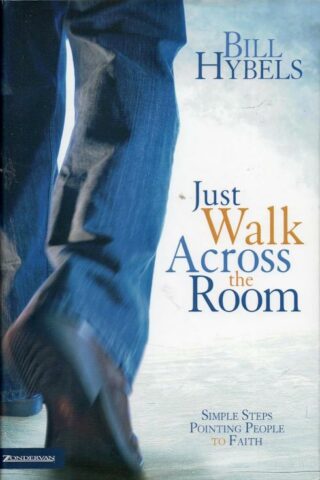 Just Walk Across The Room
Just Walk Across The Room
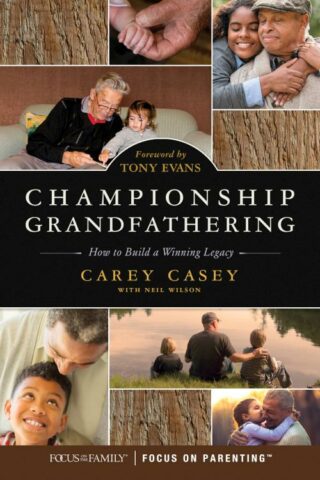 Championship Grandfathering
Championship Grandfathering
 Part Of My World
Part Of My World
 God Sees Every Tear Cross
God Sees Every Tear Cross
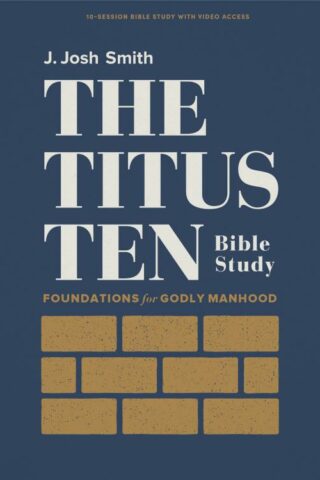 Titus 10 Bible Study Book With Video Access
Titus 10 Bible Study Book With Video Access
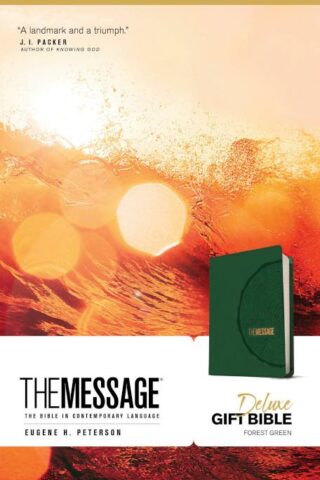 Message Deluxe Gift Bible Large Print
Message Deluxe Gift Bible Large Print
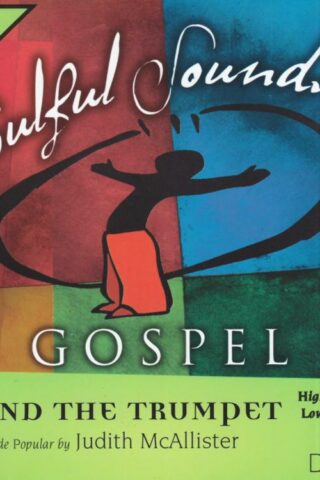 Cradle In Bethlehem
Cradle In Bethlehem
 Babys First African American Hannah The Praying Doll
Babys First African American Hannah The Praying Doll
 Black Plaid Gift Bag with Card & Tissue Paper: Happy Birthday & Many More, Large
Black Plaid Gift Bag with Card & Tissue Paper: Happy Birthday & Many More, Large
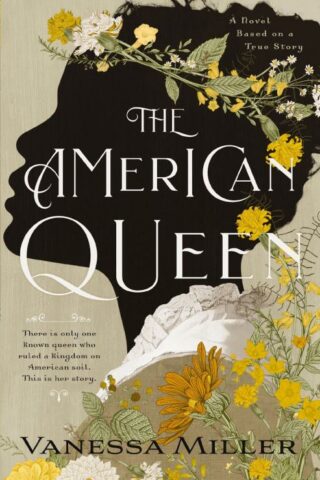 American Queen : A Novel Based On A True Story
American Queen : A Novel Based On A True Story
 Inspire Bible Filament Enabled Edition
Inspire Bible Filament Enabled Edition
 Truth
Truth
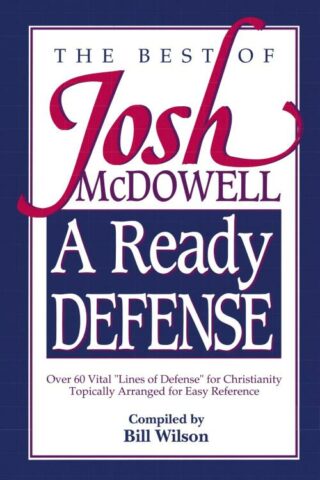 Ready Defense : The Best Of Josh McDowell
Ready Defense : The Best Of Josh McDowell
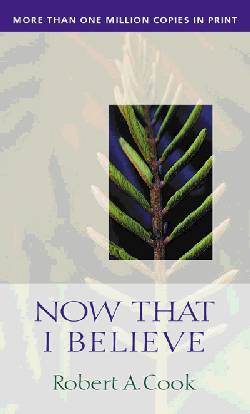 Now That I Believe
Now That I Believe
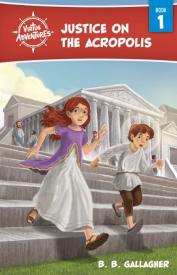 Justice On The Acropolis
Justice On The Acropolis
 Detours : The Unpredictable Path To Your Destiny
Detours : The Unpredictable Path To Your Destiny
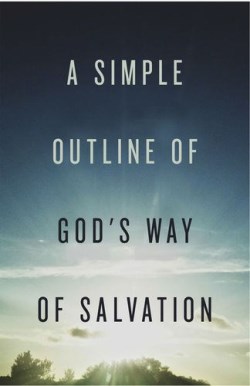 Simple Outline Of Gods Way Of Salvation
Simple Outline Of Gods Way Of Salvation
 Identity
Identity
 Every Family Has A Story Welcome To Ours Story Board
Every Family Has A Story Welcome To Ours Story Board
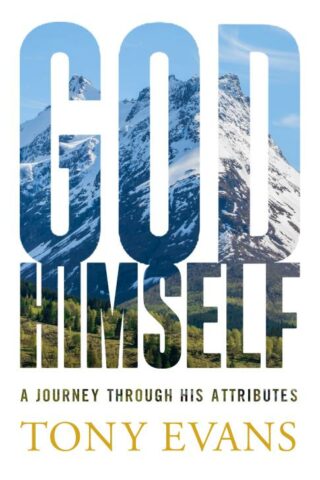 God Himself : A Journey Through His Attributes
God Himself : A Journey Through His Attributes
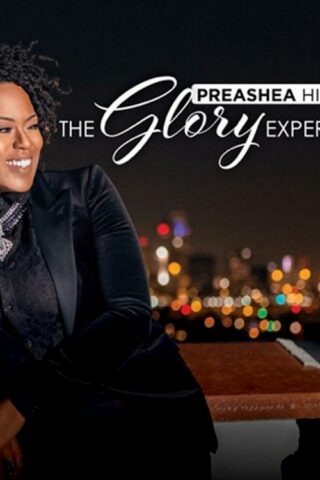 Glory Experience
Glory Experience
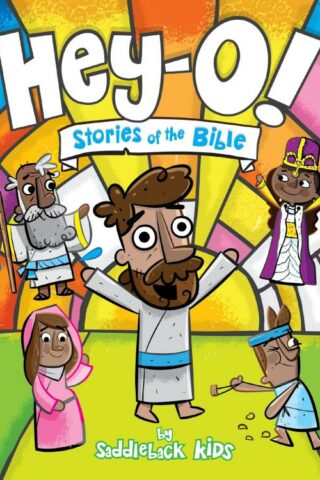 Hey O Stories Of The Bible
Hey O Stories Of The Bible
 Names Of Jesus Round
Names Of Jesus Round
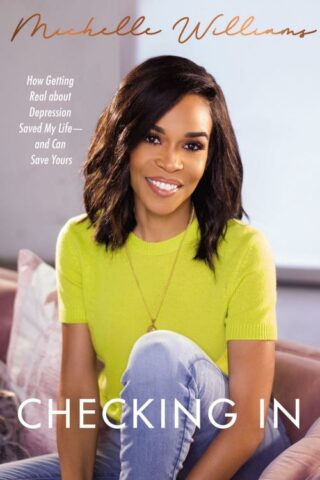 Checking In : How Getting Real About Depression Saved My Life---and Can Sav
Checking In : How Getting Real About Depression Saved My Life---and Can Sav
 Diamond Back Christ My Strength (Bracelet/Wristband)
Diamond Back Christ My Strength (Bracelet/Wristband)
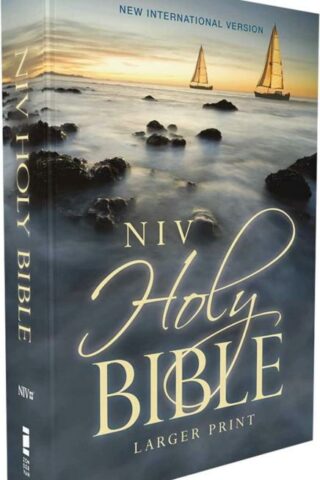 Holy Bible Larger Print Economy Edition Comfort Print
Holy Bible Larger Print Economy Edition Comfort Print

